| |
CHAPTER 13
ROME UNDER SIXTUS V
THROUGHOUT the long history of the Papacy perhaps no century has
witnessed so rapid and so deep a change as the sixteenth. The latent forces of
Catholicism --those forces which in peaceful times do not appear, but which are,
as it were, the vital sap of institutions that are really lasting-- displayed
their full vigor when the Reformation came to shake
the foundations of the Catholic structure. The cry of protest that had been
uttered by Luther expressed the feeling of many consciences besides those of
participators in the religious revolution which was freeing them from Rome. The
protest filled the hearts of even those nations too that remained faithful to
her discipline. In the darkest periods of the Middle Ages ignorance and
barbarity had degraded and corrupted the Papacy; but, when the shadows
dispersed, it raised itself again, to reach the heights attained under Gregory
VII, Alexander III, and Innocent III. The splendors of the Renaissance seemed, with one swoop, to take Rome
back to Pagan times, and in a measure to renew the pomp and corruption of the
Imperial age. But the Christian conscience was never dormant. Deeply moved, it
returned by different ways to the ideal of a spiritual purification; and
while, on the one hand, a large portion of Christendom became detached from
Rome, on the other, new ties were binding to it another portion, which sought
in the moral renewal of the Papacy a remedy for its waning power, a means of
regaining the ground that had been lost. To the great Reformers were opposed
the new saints and founders of religious Orders-to the Reformation the
Counter-Reformation. The same austere spirit and strenuously severe view of
life that inspired the followers of Calvin, seemed to exercise an influence in
Rome itself, and on the conduct of the Popes and leading men who were
furthering the new Catholic movement. While the Council of Trent was defining
more precisely the Catholic doctrine, and was consolidating the unity of the
Catholic Church by subjecting its organism to discipline, Rome underwent a
significant transformation, and, having lessened the worldly display prevalent
in the earlier half of the century, assumed a religious aspect more suited to the
changed times and to the political and religious struggles that were agitating
the world.
Italy in the latter half of the sixteenth century
Parallel with the religious movement, indeed, a great political
movement was taking place in Europe, through which the nations were, almost
unconsciously, trying to reach a settlement adapted to the new condition of
things. While the star of Spain, after having reached its loftiest altitude,
was slowly entering on its downward course, and the Empire was reduced to
weakness by the heterogeneousness of the elements composing it, England was,
with great vigor, laying the foundations of her
power, and preparing for the marvellous development
of her expansion; and France, amidst the throes of the religious strife that
was tearing her asunder, with the instinctive craving for unity destined to be,
in the succeeding centuries, her strength and one of the chief causes of her
greatness, seemed to feel that the complete victory of one party over the other
had now become a necessity for her. Among the minor States, some were either
preparing for their independence or endeavoring to
maintain it, while the others, lying eastward, were opposing the invasion of
the Turkish Power, which had by now advanced as far as it could go, but did not
lay down its arms, and remained a constant threat and peril to Christendom.
Italy felt the reaction of all these movements. Lombardy and the south,
being bound to Spain, followed her fortunes and contributed to the influence of
her policy. Piedmont, stationed by the Alps like a sentinel, was ruled by wise,
ambitious, and tenacious Princes, who carefully balanced their actions between
Spain and France, watching for every opportunity to widen their dominion, as
though they even then foresaw the great future to which their House was
destined. Venice, though she, too, like Spain, was on the verge of inevitable
decline, was still a bulwark against the Ottoman Power; and, by her numerous
and widespread interests, as well as by the adherence of her statesmen and of
her diplomatists to the ancient traditions of her policy, she was still
exercising in Europe a genuine influence. The minor principalities had no great
weight in the inner life of the country, save, in a measure, Parma, which
became important through the military genius of Alessandro Farnese; and
Tuscany, owing to her central position, her frequently sagacious policy, and
her relations with the House of France, which in various ways widened the scope
of her interests.
| Italy in the sixteenth century |
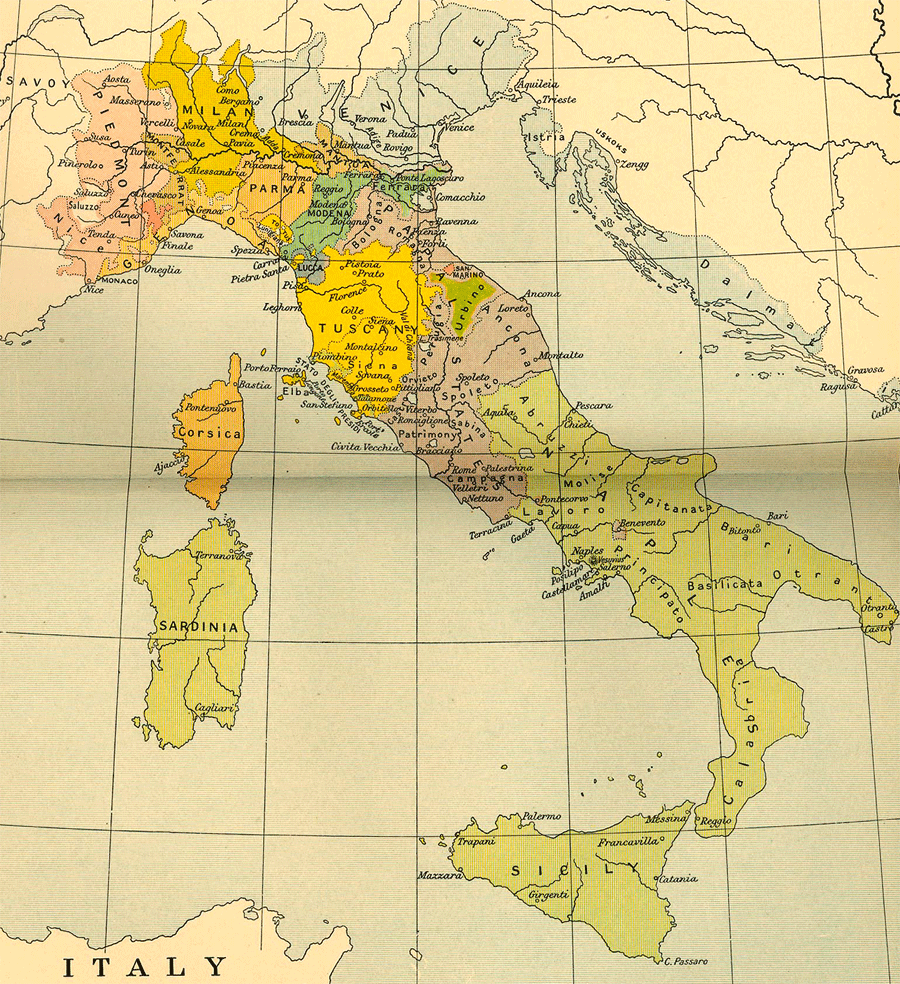 |
Among these several Italian States, that belonging to the Church
occupied a unique position. Owing to the vastness of the spiritual office of
its head, the political interests, both favorable and
hostile, of a large portion of the world were centred on Rome, while owing to its small extent the State could not exercise a real
and peaceful influence unless it were ruled with a firm hand, and governed by a
mind able to make up for its want of power and its material impotence by dint
of moral influence. The conditions of the papal State made themselves felt
outside the inner conditions of Italy and of her recent history. If the Popes
had, at the beginning of the century, consolidated their temporal power and
placed on a firmer basis the possessions of the Church, these were still
difficult to govern. The internal struggles which had divided the cities into
turbulent parties always engaged in bloodthirsty contests; the continuous
invasions of the foreigner; the soldiers of fortune who, as the military
regulations were relaxed, gradually became bandits under the command of the
wealthy lordlings dominating the country by their
castles, and whose power grew excessive in the city by reason of their palaces,
now a refuge of impunity for malefactors - all these were causes of an anarchy
fatal to the order of public life and the source of lasting weakness to the
papal rule.
The dominating thoughts which determined the political action of
Rome in the latter decades of the sixteenth century were the application and
development of the decrees of the Council of Trent, the war against
Protestantism, and the defence of Christendom against the Turks. Pius V had
devoted to these aims the whole ardor -unbending,
nay, at times pitiless- of his asceticism and of an unswerving faith, promoting
the change from the medieval ideas of the Church to the new ideas and to the
new Catholic discipline with a thoroughness that has perhaps not yet been
sufficiently gauged by any historian. Gregory XIII followed in his steps,
continuing his ideas in his international relations and in the persecution of
the heretics, and furthering the tendency he had imposed on the new culture by
the reform of the Calendar, and by the support given by him to the Order of the
Jesuits, who under him began everywhere to control the instruction of the
Catholic youth, and who, by means of the formation of the Collegium Romanum, became for almost three centuries absolute
masters of education in Rome. But if this Pontiff so far acted in harmony with
the central tendencies of the Church, he was not equally efficacious as head of
the government. The badly managed finances, the unceasing abuses, and the
turbulent and disorderly state of the territories subject to the papal rule,
had now brought things to an intolerable pass, with which the strength of the
aged and vacillating Gregory was wholly unable to cope.
The need for a firm hand and a sure eye had become all-important; and
when, on April 10, 1585, Gregory died, it was with a feeling of uncertainty
mingled with hope and fear that Rome saw the Cardinals enter into conclave for
the election of a new Pope. While the foreign Powers strove for the success of
the candidates who appeared most favorable to their
interests, the Romans, without being able to exercise much influence in the
matter, felt that the new election might be of vital importance for them and
for the whole state of the Church. They had not long to wait, and on April 24
Rome learnt that the new Pontiff had been elected. It was the Cardinal di Montalto (Felice Peretti) who took the name of Sixtus V.
1518-56] Earlier life of Sixtus V
Pope Sixtus V (13 December, 1520 – 27 August, 1590), born Felice Peretti di Montalto, Pope from 1585 to 1590 |
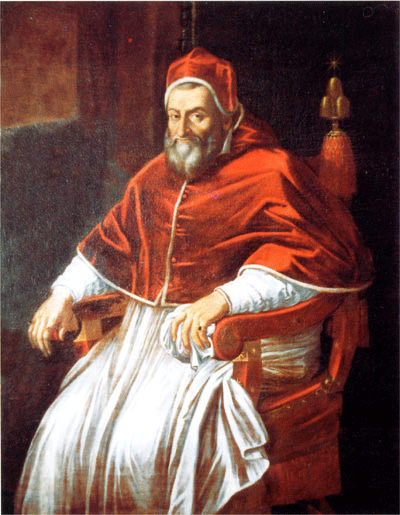 |
There are moments in history which seem urgently to demand a strong
personality, such as will sum up the tendencies of the time, and stamp them
with its own character. The new Pontiff was one of these personalities. His
father was descended from a family originating in Dalmatia, which had, like
many others, fled across the Adriatic to seek refuge in Italy, when the Turks
after invading Illyria were threatening the coasts of Dalmatia, and which had
settled at Montalto in the Marches, being possessed
of some competence. The father of the future Pope saw his patrimony ruined in
1518, when the Duke of Urbino took and sacked Montalto,
and he withdrew to a place not far distant but higher up in the mountains, the
borough of Grottammare, where, on December 13,1521,
the son was born to him who was destined to rise so high. The Venetian
ambassador Lorenzo Priuli, in telling the Republic
what he knew of the new Pope, related how he had heard from a well-informed
person that the father had called the child Felice because he had, before its birth, had an omen of its destiny in a dream. This
is possible, and it is also possible that, according to the universal tradition, Sixtus in his early youth had charge of the pigs in
his father's fields; but it is as well to bear in mind that, from the very
beginning of his pontificate, the strange figure of the Pope was surrounded
with a legendary halo which never left him.
At the age of nine Felice went to an uncle who
was a friar in the Franciscan monastery of Montalto,
and at twelve he took the habit of a novice. Intelligent, eager to learn, and
devoted to his studies, he soon distinguished himself. While still very young he
began to preach, quickly achieving a high reputation as a sacred orator, and
was called from convent to convent in many parts of the country, in order to
display his oratorical power. He had an easy and abundant mastery of words,
considerable ecclesiastical erudition, and the torrent of eloquence that
springs from great self-confidence and from strong convictions, passionately
felt and relentlessly expressed. In the church of his convent of the Santi Apostoli at Rome, whither
he went in 1552, being then a little over thirty years of age, his preaching
was extraordinarily successful, and procured him friendships which were
destined to have a great influence on his life and character. Cardinal Caraffa and Cardinal Ghislieri,
both of them subsequently Popes, under the names of Paul IV and Pius V,
Cardinal Carpi, St Ignatius Loyola, and St Philip Neri,
became his friends at this time; and through his intercourse with them the
mind of the young friar was inspired with a warmer zeal for the Catholic faith
and with a deeper resolve to secure its triumph with all his strength. After
having held the office of Hector in several convents, he was, in 1556, sent to
Venice to rule the convent of the Frari. His
instructions were to bring the friars back to a rigorous observance of the
rules, and to restore the discipline that had become relaxed. So delicate a
mission raised up against him a number of enemies, who attacked him with
deceitful stratagems, while he went his way, without heeding any man. At
length, however, these accusations caused him to give up the office; but
justice was then done him, he was invited by Rome to take up the post again,
and appointed Councillor to the Inquisition at
Venice. He revenged himself for the calumnies to which he had been exposed by
conferring benefits on his principal adversary, a certain friar, who, however,
went on plotting in his despite, and succeeded in raising new enemies against
him. In this the very character of the Inquisitor aided his enemy; for Peretti brought to his office a zeal and a severity that
appeared excessive to the Venetian government, which was always jealous of
interference from the ecclesiastical authority, and, indeed, demanded and
obtained his recall. He returned to Rome, and in these surroundings, which were
better suited to him, was very well received, gained great influence, and
rapidly rose. He again rendered a service to his Venetian calumniator, and his
magnanimity made a good impression. Lecturer at the University, councillor to the Holy Office, procurator-general and
apostolic vicar of his order, he displayed in all the posts held by him a zeal
and an energy which made him more and more conspicuous among the heads of the
Catholic reaction. He was appointed by Pius V to accompany to Spain Cardinal Boncompagni, who was to examine the charge of heresy
against Carranza, Archbishop of Toledo, which subsequently resulted in his
condemnation. During this voyage that deep antipathy between him and Cardinal Boncompagni first showed itself which was to declare itself
more openly when the latter became Pope. On his return to Spain the new Pope,
Pius V, made him a Bishop, and in 1570 a Cardinal. He took the name of Cardinal di Montalto.
Pope Gregory XIII (7 January, 1502 – 10 April, 1585), born Ugo Boncompagni, Pope from 1572 to 1585 |
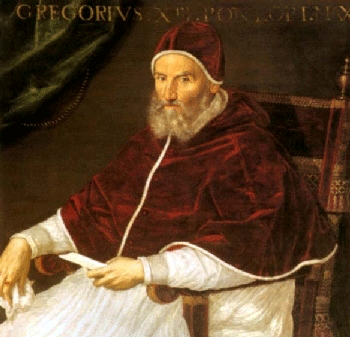 |
The poor friar
was now numbered among the great ones of the earth, and he might well feel in
his inmost heart that he was called to exercise an influence on the history of
the Church; but his aspirations were soon checked. Pius V, who had such
confidence in him, was succeeded in the papacy by Gregory XIII (Boncompagni), who was decidedly hostile to Montalto and was not long in showing his aversion. Having
been laid on one side, Montalto withdrew so far as
possible from public affairs, and adopted an attitude of complete reserve,
which was at times interrupted by bitter sarcasms that were not calculated to
restore him to favor. He wrapped himself in his studies and endeavored, so far as his somewhat scanty means
permitted, to patronize the arts, as if by way of
augury and preparation for the great works he was subsequently destined to
accomplish at Rome. Learned as he was in canon law and in the study of the
Fathers, he completed a work on Gratianus, and
undertook a new revision of the writings of St Ambrosius.
At the same time, employing a young architect of Como, Domenico Fontana, of whose ability and energy he had soon formed a high opinion, and
whom he inspired with his own genius, he began to build himself a house
surrounded by gardens near the basilica of Santa Maria Maggiore; and in the
basilica itself he erected a monument to the Franciscan Nicholas IV, and began
the rich chapel in which his own sepulchral monument and that of his benefactor
and friend, Pius V, were afterwards to be placed.
Thus, in the life of solitude
and leisure to which the disfavor of the Pope forced
him, Felice Peretti was
maturing his thoughts, and, while watching the conditions of the State, he was
meditating what steps he would take on its behalf if Providence were one day to
call him to rule over it. Consciousness of a lofty destiny, suppressed energy,
irritation at seeing the highest matters in weak hands when the utmost strength
was needed - all these were so many spurs to his thought and prepared it for the
future. A whole programme of government was forming in his mind. He thought how
an orderly condition of things and a firm internal policy could not fail to aid
the action of the Church in the world, and considered the means whereby to
readjust the finances, to embellish Rome, and above all to put an end to the
murderous anarchy which was infesting the papal provinces and making Rome
itself the theatre of every kind of crime.
1585] Sixtus V and Orsini.
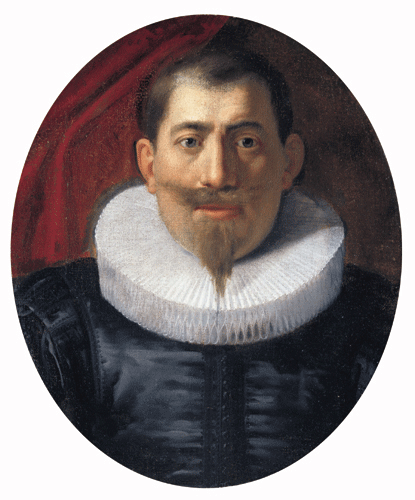 |
Paolo Giordano I Orsini (1541 - 1585) duke of Bracciano from 1560. The son of Girolamo Orsini and Francesca Sforza, he was grandson, on his father’s side, of Felice della Rovere (illegitimate daughter of Pope Julius II) and Gian Giordano Orsini and, on his mother’s side, of Count Bosio Sforza and Costanza Farnese (illegitimate daughter of Pope Paul III). In 1558 he married Isabella de' Medici, daughter of Cosimo I de' Medici, Grand Duke of Tuscany. In 1571 he took part to the battle of Lepanto. Two years later he fought in the Spanish expedition against Tunis with six Tuscan galleys. Described as a ruthless, violent and rude figure, in 1576 he strangled his wife, Isabella de'Medici (accused of a love affair with his cousin Troilo Orsini) in the Villa Cerreto Guidi near Florence, probably with the complicity of her brother Francesco. The following year he had Troilo killed by archibusiers. After the crime he fled to Rome where he started a relationship with Vittoria Accoramboni, wife of Francesco Peretti, the nephew of the future pope Sixtus V. Peretti was assassinated by Paolo Giordano's order in 1581. Wanted by both the Papal and Florentine police, he took refuge in northern Italy, first in Venice and then in Abano and Salò with his mistress, whom he married on April 20, 1585. Paolo Giordano Orsini died in 1585. However, in the December of the same year Vittoria was assassinated by Ludovico Orsini of the Monterotondo line, in revenge of his brother Roberto's death in the course of a feud connected to Paolo Giordano's deeds. His fiefs were inherited by his son Virginio Orsini, whom he had with Isabella. |
| Vittoria Accoramboni (1557 - 1585) |
|
He himself had been assailed in his
warmest affections by an atrocious assassination, and the Pope had not had the
power to see that justice was done him. When Peretti had begun to rise in the offices of the Church he had caused a sister of his,
Camilla, who was very dear to him, to come to Rome with her two children,
Francesco and Maria. The latter married Fabio Damasceni,
a Roman gentleman, and had two sons and two daughters, who were all marked out
for a high station. Her brother, Francesco, had married a girl of the lesser
nobility, Vittoria Accoramboni,
who had, by her grace and rare beauty, soon become one of the favorite ladies in Roman society.
Paolo Giordano Orsini, one of the greatest lords of Italy, a man of mature
age and of ardent passions, whom rumor credited with
the murder of his wife, Isabella de' Medici, the sister of the Grand Duke of
Tuscany, fell violently in love with Vittoria. This
passion was encouraged by Vittoria's mother, who,
being ambitious, and not foreseeing the future elevation of the Cardinal di Montalto, spurred on the
ambitions of her daughter, seeking in some way to unite her to Orsini. One night, Francesco Peretti,
having been drawn into an ambush by the brother of Vittoria,
was killed and left lying in the middle of the street. The boldness of the
crime, and the rank of the victim and of the assassins, whose names were on
everyone's lips, caused a deep emotion in Rome, accustomed as the city was to
deeds of bloodshed. Only Cardinal di Montalto, though moved to his inmost heart, appeared to be
undisturbed. He comforted his sister, who, in her despair, demanded justice,
and, on the day after the murder, presented himself at a consistory with a calm
that astonished everyone; and to the Pope who turned to him, moved even to
tears, he replied with dignity that one must be resigned to the will of God.
Gregory XIII, touched to the quick, attributed this resignation to hypocrisy. Montalto, for his part, expected that justice would be
dealt out to the perpetrator of the crime; but, seeing that the Pope was too
weak to inflict it on Orsini, he did not wish to
humiliate himself by demanding it. A few days afterwards Vittoria Accoramboni fled to the castle of Bracciano,
the home of Orsini. This appeared to be a confession
of guilt, but perhaps the Cardinal di Montalto never held her directly guilty of her husband's
murder. Having been forced to return to Rome, Vittoria was for a time kept prisoner in the Castello Sant'
Angelo; but on being set free she returned to Bracciano,
and in spite of ecclesiastical prohibitions and impediments, she married Orsini during the conclave which followed the death of
Gregory XIII, on the very day of Sixtus V's accession
to the throne.
According to the legend, which has survived in Rome to the
present day, Sixtus, who had entered the conclave
bowed down, like a weak and trembling old man, on hearing his name proclaimed,
haughtily raised himself up, and, having thrown aside his crutches, cried out
that he was now the master and that all were thenceforth bound to bend before
his will and to obey him. It is a legend that symbolises the truth. The man who had matured his thoughts of government, while
suppressing his own energy during the long years of forced inactivity, showed
himself, by a singular contrast, from the very first day of his pontificate
ready for his work and inflexibly determined. The first thought to which he
turned his mind was the restoration of public order in Rome and in the whole
State. With his rapid intuition he quickly saw that he must needs assert
himself immediately and strike the minds of men by revealing himself in a kind
of terrible majesty. Like Napoleon in a later day, Sixtus V possessed in a singular degree the gift of impressing his immediate
surroundings with his personality and of passing
this impression on to others at a greater distance. "Now he is gentle,
now terrible," was said of him by Lorenzo Priuli,
the Venetian ambassador, "now easy, and now difficult, now close and
frugal, and now of the most generous disposition; prudently employing this
diversity of character in his relations with private individuals and with
princes, according as the times, the places, and the persons differ."
Indeed, during the early days of his pontificate, Sixtus displayed prudence and boldness at the same time. While, for the time being, he
made few changes in the offices of the State, in order to become acquainted
with the attitude of those occupying them and to familiarize himself with current affairs, and while he treated the various ambassadors with
cordiality but with great caution, till he should have the threads of his
policy well in hand, he of a sudden advanced straight on the object in which he
was most deeply interested. When the representatives of the city of Rome went
to pay homage to him, and begged him for justice and liberality, he replied
severely that they would have both one and the other, but that as for justice
it lay with them to exercise it, adding that, if they were not ready to do
their duty, he was resolved, if need were, to have their heads cut off; and
with these haughty words he straightway dismissed them. Paolo Giordano Orsini received similar advice. He had falteringly presented
himself to do homage to the new Pope, whose nephew he had caused to be
murdered. He was received with an icy silence that terrified him. With the aid
of the Spanish ambassador and of the Cardinal de' Medici Orsini obtained a second audience; but again the Pope, eyeing him haughtily, received
his protestations of fidelity in silence; then, suddenly interrupting him, he
exclaimed : "No one desires more than I that an Orsini should conduct himself as is fitting; ask your conscience if it has been so
hitherto. Remember that I voluntarily pardoned all that you did against the
Cardinal di Montalto, but
that I shall not pardon what you may attempt against Sixtus.
Go, and dismiss at once the bandits you have around you at Bracciano."
| Bracciano Town and Lake |
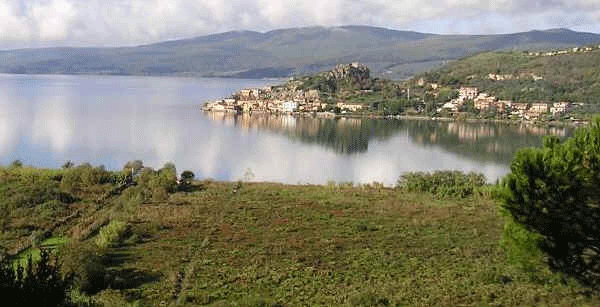 |
Orsini felt that the time for resistance had passed.
He immediately withdrew to Bracciano, and, obeying
the order, dispersed the numerous bandits whom he had gathered during the
conclave. But even so he did not feel himself safe. He left the papal State and
retired to the territory of Venice, where he died after some time, and where
his widow, Vittoria Accoramboni,
was cruelly killed by another Orsini.
The firmness of
the Pope greatly impressed Rome, and this impression was deepened when, four
days after his accession to the throne, Sixtus condemned to death four youths who were found carrying arms notwithstanding a
decree prohibiting the practice. Every entreaty on their behalf was in vain,
and the inexorable Sixtus had them hanged before the
bridge of San' Angelo. Rome now felt the hand of a
master, from which it was useless to attempt to escape.
Having thus vigorously
seized the helm of the State, Sixtus devoted himself
to the tasks which were of primary importance for the organization of his government. He appointed the governors of the provinces, and surrounded
himself with Cardinals who had stood well with Pius V, thus at the same time
showing his gratitude to the memory of the Pope who had raised him to power,
and removing to a distance and setting aside the friends of Gregory XIII, whom
he did not trust. But even to those who surrounded him he did not leave much
power, reserving for himself the principal affairs and every important
decision. Endowed with inexhaustible activity and with great rapidity of
thought, he began, while setting himself the task of restoring the public
security without a moment's pause, to occupy himself with diplomacy, with
finance, and with the great buildings which he intended raising in order to
renew Rome and to erect for himself the monument of glory to which he aspired.
He provided for his family with considerable liberality, and in his first
consistory suddenly showed that he wished to exalt it, naming as a Cardinal his
grand-nephew Alessandro, still a youth. The nomination caused displeasure, as an
act of nepotism for which there was no excuse; and, though the new Cardinal di Montalto subsequently honored the purple by high qualities and great nobility of
character, the censure called forth by his elevation was deserved, and showed
that in ecclesiastical matters the public conscience was now opposed to abuses
in favour of the personal and family interests of the Popes.
Early diplomatic relations of Sixties V
His earliest
relations with the ambassadors accredited to the papal Court enabled Sixtus to become acquainted with them and to settle his
policy more precisely. He was cautious with the ambassadors of Spain and
France, but showed himself more open with the representatives of Venice and of
the Grand Duke of Tuscany. He did not fail to impress upon the Grand Duke that
he had not forgotten the ties of the old friendship and of the gratitude which
bound them to each other, and that he was fully conscious of being largely
indebted for his election to the Grand Duke's brother, the Cardinal de' Medici.
He assured the ambassador of Venice, whom he received at once with great
cordiality, that he always intended acting in harmony with the Signoria, that he was well aware of the difficulties of the
Republic, surrounded as she was on the one side by the heretics and on the
other by the Turks, and that he would always try to help her; and he kept his
word, for during his pontificate he always showed himself favourable to the policy of Venice, and often followed her tendencies and counsels. His
caution with the other diplomatists was not uncalled for. Philip II had not
viewed the new election with a favorable eye, and
dissembled the mistrust aroused in him by his ambassador, Olivares, who was
always hostile to Sixtus; while, on the contrary,
King Henry III of France was, with his usual levity, expecting too much from
him, and thinking that he would find in him an easy instrument for his fickle
policy.
Gaspar de Guzmán y Acevedo, 1st Count-Duke of Olivares (1587 – 1645), favorite of Philip IV. As prime minister from 1621 to 1643, he over-exerted Spain in foreign affairs and unsuccessfully attempted domestic reform. His policies of committing Spain to recapture Holland led to his major involvement in the Thirty Years War (1618 - 1648) and his will to centralize power led to revolts in Catalonia and Portugal which brought about his fall. |
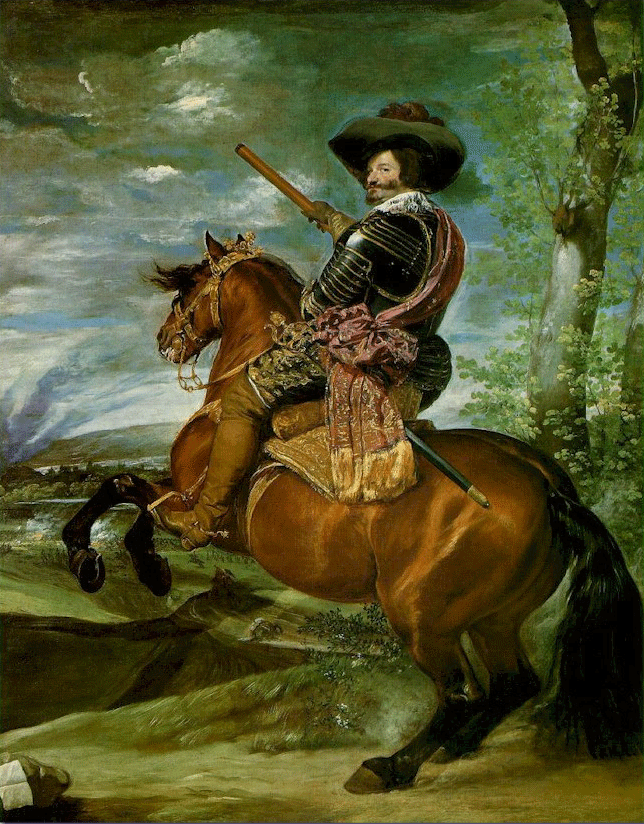 |
1585] Brigands and nobles
Having in view his immediate goal, that of restoring order, Sixtus was bound not merely to act with a strong hand in his own State, but to induce the neighboring princes to act with him, which was no easy matter. Italy was a prey to a system
of brigandage widely and strongly organized under the
guidance of experienced and audacious chieftains, who had often sprung from the
noblest families and were surrounded with that charm, made up of terror and of
sympathy, which exiles of this type are wont to inspire in rough and
imaginative minds. Alfonso Piccolomini, Lamberto Malatesta, Ludovico Orsini were real leaders
of bands which were formed or dispersed according to the chance of the moment,
and which infested Romagna, the Marches, the Campagna, and the sea-coast of the
papal State, at times attacking even the cities, and devastating the regions
rendered insecure through their invasions, and even more insecure by reason of
the intervention of the soldiers sent by the government to oppose them, who
often did more damage than the bandits themselves. When danger threatened the
bands dissolved, and, crossing the boundaries, disappeared in Tuscany, the
State of Venice, the duchy of Urbino, or the kingdom of Naples. The baneful
plant that had long been tolerated had struck deep roots which it seemed
impossible to pluck out. Gregory XIII had proved himself powerless; and the
other States were very weak, and perhaps at times even not a little pleased to
add by their indifference to the embarrassments of the Pontiff, whose relations
with them, especially in ecclesiastical matters, did not always go on smoothly.
Under Sixtus, however, this aspect of things changed rapidly.
His moderation in maintaining the rights of the Church in the States of his neighbours called for a return, and they became imbued with
his own energy. His continuous representations to the princes and their
ambassadors bore fruit. The bandits, no longer finding a secure asylum outside
the State, were within its bounds hunted like wild beasts, without pity, and at
times with a doggedness that resembled ferocity. Above all it was necessary to
clear the infested districts immediately round Rome; and Sixtus committed this task to the Cardinal Colonna, who discharged it with a vigor and promptitude that paralyzed all resistance. One by one the chiefs of the bands were captured and put to
death with their followers and accomplices, no mercy being shown. Heads fell in
great numbers, and were exposed in every corner of the district, a spectacle
full of horror and of terror. The capture of the priest Guercino,
who was called the King of the Campagna, and who, by the audacity of his
crimes, had made himself master of it to such an extent as to force Gregory
XIII to come to terms with him, struck a great blow at brigandage in the
vicinity of Rome. When his severed head was exposed on the battlements of
Castello Sant' Angelo, Rome felt that peace was
returning, and applauded the severity displayed, more especially as it was
aimed not merely at the brigands outside but also at the evil-doers of every
kind within the city, without sparing the nobles, on whose overweening spirit
the hand of Sixtus weighed resolutely and
relentlessly.
Nor was it at Rome alone that his hand weighed heavily on the nobles;
its sway extended likewise to the barons of the provinces, in order to wrest
from them a power that was no longer justified and that had become an
instrument for acts of private oppression and violence. Terrible above all
seemed the condemnation of Giovanni Pepoli, a man
who, with many faults, still had the reputation of a noble and generous mind,
and who represented at Bologna one of the greatest and most famous families of
the papal State. Being accused of having shown favor and given a refuge to
bandits, and of having refused to surrender one of them, he was condemned to
death and strangled, no heed being given to the prayers of many persons on his
behalf, to the interest of several princes, and to the efforts of the powerful
Cardinal d'Este, who was very indignant at his death
and bitterly lamented it. The greatness of the family that was struck, the
authority of the man, the swiftness of the penalty made a deep impression. The
Pope was taxed with cruelty, and subdued murmurs were heard; but the nobles
began to feel that it was no longer the time to make common rause with the brigands, nor to stir up too violently the factions into which the
families were divided, especially in Romagna. The Venetian ambassador, Priuli, always an acute observer, wrote to the Senate :
"These princes of the Church, being moved by this example, will, it is
said, keep at as great a distance as possible, seeing this severity on the part
of the Pontiff, and the small respect that is shown them. But on the other hand
it is fully believed that this severity is of great good to the peaceful
public, seeing that every man will be warned to have his wits about him and to
live with feelings of modesty and respect towards his Prince." The power
of the barons, a remnant of feudal ideas and of democratic tyrannies, was
indeed struck to the heart by Sixtus V, and
supplanted by the modern conception of the unity and of the central authority
of the State.
In order to overcome the brigandage which was growing more
terrible in the provinces, the Pope, as we have said, required the cooperation
of the States bordering on his own, and to that end he worked upon the
ambassadors and also directly upon the princes. He endeavored to show how dangerous an element of weakness was being introduced into the
whole of Italy by these internal enemies, who constituted a kind of army which,
as he used to assert, would be able, at any given moment and in one way or another,
to ally itself and act in concert with the Turks or the heretics, to the injury
of the Catholic States. Nor will this assertion appear greatly exaggerated if
it is borne in mind that the number of the bandits in the papal State alone had
during the last years of Gregory XIII risen at certain moments to twenty-seven
thousand, a number corresponding very nearly to that of the regular soldiery in
the pay of the Princes of Italy. By his urgent demands the Pope managed to
obtain the assistance of Spain for the Neapolitan district, and of the Dukes of
Ferrara and Urbino; the last-named, indeed, not satisfied with fighting
against and capturing the bandits, succeeded in destroying an entire band by
the horrible stratagem of causing poisoned food to fall into their hands. More
difficult were the negotiations with Venice, who, though well disposed towards
the Pope as he was towards her, yet found herself much hampered by the
traditional and jealous regard which, like modern England, she cherished for
the right of asylum. Sixtus V proposed a kind of
treaty of extradition; and, after many difficulties, Venice came to an
agreement by which the Republic pledged herself to refuse shelter to the
bandits of the papal State, though not without certain reserves. Pressing on
the brigands from every side, he overcame the last scruples of the Grand Duke
of Tuscany, which had actually for a moment almost endangered the friendly
relations between the two States, and obtained the extradition of one of the
principal bandits, Lamberto Malatesta,
who had for years terrorised the Romagna, and who,
having been brought to Rome, was there decapitated. Thus, in little more than
two-years, with a relentless tenacity and firmness, by rigorous methods which cannot
be reviewed without repugnance, but may to a certain extent be justified by a
condition of disorder that seemed otherwise irremediable, Sixtus V succeeded in bringing back security and restoring the life of the country to
a normal condition. The inhabitants breathed again, and if the Pope's
government appeared at times too harsh and cruel to the Romans to whom it was
close at hand, it was in the provinces respected as a rule that carried freedom
with it.
1585-9] The Monti
Speaking one day with the Cardinal de Joyeuse,
and expressing his pleasure, as he often did with the diplomatists and foreign
personages, at having brought back peace to the State and restored the papal
authority, Sixtus observed that two things were
needed to govern well, namely, severity and a great deal of money. The vast
ideas he was revolving in his mind, both as regards the public works he
proposed to complete, and the impulse that he wished to give to his policy,
were of such a kind as could be realized only with
the aid of a well-filled exchequer, whereas that of the papal State when he
ascended the throne was exhausted. The same tendency to move straight towards
his goal that had guided his action in the extirpation of brigandage seemed to
dominate him when he entered upon the task of rearranging the finances. But
this was a more delicate and difficult matter to regulate, and his financial
system, though it achieved the aim he had set himself, and filled the State
treasury with gold, appeared to many to be very imperfect. By wise measures he
reduced many useless expenses; but these economies were far from sufficient for
his needs, and he was forced to have recourse to the sale of the public
offices, and to the development of the institution of the monti,
which were practically a kind of public loan at a fairly high rate of interest.
The offices and the monti were divided into vacabili and non vacabili. Uffici vacabili were those which
ceased with the death of the purchaser, and in certain cases with his promotion
to the cardinalship or to a bishopric; and monti vacabili were loans that were redeemable within a limited
period under a system of sinking funds, while the monti non vacabili represented the permanent debt of the
State.
It was a defective system which he had not created, but to which he gave
a very wide development; and, though during his lifetime he kept down the
abuses to which it gave rise, they soon reappeared after his death. It need
hardly be said that these sales of remunerative offices and loans went hand in
hand with an increase in the taxation of the people, who often found it heavy
and complained. But the magnificence of the public works, the roads opened to
facilitate commerce, and the new industries that were encouraged and
introduced, in a measure atoned for the burden of the imposts in the eyes of
the people. In the course of a few years, in spite of his enormous expenditure
during his pontificate, Sixtus might be considered
one of the wealthiest sovereigns in Europe; and while princes who were so much
more powerful than himself, such as the King of Spain, were hampered by their
want of means and struggling to find money, he complacently remarked, a short
time before his death, that in the Castello di Sant' Angelo was lying stored, in gold and silver, a sum of
four million and six hundred thousand crowns. The withdrawal of so vast a sum
from circulation appeared to many, even in his times, as an error in finance,
which indeed it was. It was realized that Sixtus was a politician and not a true financier, who has
regard for the future development of the wealth of the State. It was considered
absurd that the people should be heavily weighed down by taxes in order to
accumulate millions destined to remain idle; but Sixtus knew the great power that accrued to him from this stored-up wealth, which gave
him a special importance in the eyes of the other princes-always in want of
money, in spite of their great revenues. For every undertaking that was
proposed it was indispensable to have ready money, and all turned to him for
aid, of which in truth he was not lavish; and thus the need of the others
imparted authority to himself, and enabled him to intervene in every problem
that interested him.
And these problems went on multiplying and keeping the
thoughts of Sixtus V on the alert. His mind blended
together, in a union by no means rare at certain periods of transition, the
practical energy of the statesman and the fervor of
the mystic. His monkish education, his first aspirations, his friendship with
the most ardent and active champions of the Counter-Reformation, the struggle
which he had seen raging, from his childhood onwards, against heresy and
against the Turk, determined the currents of his policy and traced out his life
for him. To bring back the erring Christians to the obedience of the Church,
and to join together the Christian forces in repelling the Muslim invasion and
in freeing for ever the sepulchre of Christ, these were the chief aspirations of his mind, which, like the
contemporary muse of Torquato Tasso, was idealizing in the future the forms of the past. Revolving
these thoughts within him, he felt that, though not yet sure of the means
whereby to achieve them, he ought to approach Spain, and that he would never be
able to separate himself from that Power. He had been elected against the wish
of Philip II; and his alert, energetic, and impetuous disposition was in
absolute contrast with that of Philip, who was always so reserved, cautious,
and procrastinating. There was a constant basis of mistrust in their relations
during the whole of his pontificate; and assuredly no efforts to overcome it
were made by the ambassador, Olivares, whose dignified haughtiness was at every
moment irritated by the blunt and imperious ways of the Pope, and by his
opposition. But in spite of this mistrust, the Pope was too necessary to Spain,
and Spain to the Pope, for it ever to be possible that they should separate and
go entirely different ways. They were the two greatest and, so to speak,
essential representatives of the Catholic principle. Sixtus soon turned to Philip and, with the ardor of a man
new to the difficulties of State, began to communicate to him his plans, which
appeared too vast to the colder and more experienced Spanish sovereign. The
point on which they differed from the very beginning, and which more than
anything else gave rise to the mistrust between them, was the condition of
France.
1585-6] Sixtus V and Philip II
Philip II by Tiziano |
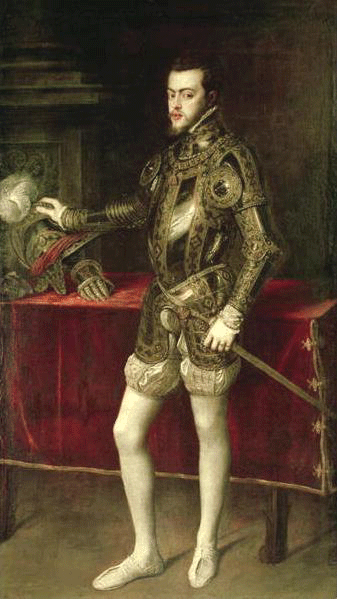 |
To the ambitious aims of Philip the religious discords opened the
prospect of splitting up that kingdom to his advantage, on the pretext of
restoring in it the unity of the faith; whereas the Pope felt that the
excessive growth of Spain at the expense of France would be injurious to
Europe, and, in the long run, to the cause of Catholicism. The condition of
France was exceedingly precarious, and it was not easy to follow a definite and
decisive policy with regard to her. Pending the development of events it was
better in the meantime to employ one's energy elsewhere. To free the coasts of
the Mediterranean from the Muslim by the conquest of Algiers, and to restore England
to the bosom of the Church of Rome, were the two pivots on which the Pope would
have liked to rest his policy; but the King of Spain saw the difficulties of
the situation, and realized that the war with
Flanders in which he was engaged was in itself a sufficiently great undertaking
for the moment. Sixtus had to give up the idea of a
conquest of Algiers, but he did not give up the conversion of England. It
seemed clear that if this island were once snatched away from heresy, the
victory of Catholicism on the Continent would be comparatively easy. Queen
Elizabeth was to the heart and imagination of Sixtus a source of torment and of hope. She fulfilled his ideal, this sovereign whose
woman's breast contained such virile energy, and who understood and seconded
with so much decision and self-possession the impetuous strength of a people
that was pressing forward to the conquest of a new world, along the unknown
paths of the future. To convert her to Catholicism, to unite himself with her
in action, to transform Elizabeth into a Countess Matilda, was his dream, the
dream of a monk on the throne. It remained a dream, but during a great part of
his pontificate it did not leave his thoughts, and several times he lent a
ready ear to agents, especially Jesuits, who fed his illusion.
This illusion, however, did not prevent him from combating English
Protestantism with various weapons. Some proposals which had, through the
instrumentality of the Cardinal d'Este, been made by
France to the Pope, for reuniting the principal French Catholics in an
expedition against England, aroused the attention and anxiety of the Spanish
ambassador, Olivares; and the Pope availed himself of this to urge Philip to do
something on his side. Spain's position with regard to England was such as to
leave no peace in Philip's mind. The swift boldness of Drake and of the other
English adventurers who ploughed the sea, paralyzing Spain's maritime power, would have sufficed to incite him to act, even though
he had not had other motives, other fears, and other ambitions. Rome encouraged
him; and gradually the conception was matured and the preparations begun for
the expedition of the Armada, which was to invade England. This chapter is not
the place for narrating this famous expedition and its results, which were of
such decisive importance for England, but it is necessary to recall that Sixtus eagerly encouraged the expedition, especially at the
beginning, striving to overcome the continuous hesitation of Philip II, and
supporting the enterprise with money, and still more with promises of money,
which, while awaiting the issue of events, the Pope was in no hurry to lavish,
and which he subsequently refused to pay. The delays of Philip caused him
anxiety, and fear lest the undertaking should fail. Writing on one occasion to
Philip, he said bluntly : "Your Majesty wastes so much time over the
consideration of your undertakings, that when the time comes to carry them out
there remains neither time nor money"; and, another time, when lamenting
this inactivity to the Venetian ambassador, he compared Philip and Elizabeth,
saying of her that he would have loved her for her great valor more than any other Sovereign, if she had been Catholic, and adding that he had
uneasy presentiments with regard to the Armada. The death of Mary Stewart
appeared to him as a challenge, and, by irritating him against Elizabeth,
increased his desire to hasten on events. He felt that England would not stand
waiting without preparing herself, and redoubled his exhortations. In August of
the year 1587, after the nomination of William Alien as Cardinal, he still
wrote to Philip II : "This morning I held a Consistory and Alien was made
a Cardinal in order to satisfy your Majesty, and although in proposing him I
had a pretext that should have disposed of every kind of suspicion, yet I am
told that people at once began to say, in Rome: 'Now they are preparing for the
war against England'; and that this assumption is widespread. Therefore let
your Majesty not delay, so that you may not do greater harm to those poor
Christians [the English Catholics]; for by procrastination the wise decisions
you have come to would turn out badly."
The destruction of the Armada,
which showed the foresight of Sixtus, had increased
the latent bad feeling between him and Philip, inclining him more and more to
regard the affairs of France from a point of view that could not commend itself
to the Spanish sovereign. The intimate and cordial relations between Sixtus and the ambassadors and the Signoria of Venice also caused Philip anxiety; for he knew how Venice favored the pacification of France by means of bringing
together Rome and the King of Navarre, with a view to his conversion.
1585-8] Sixtus V and Savoy
Charles Emmanuel I (1562 – 1630), Duke of Savoy from 1580 to 1630, nicknamed "Head of Fire" for his rashness and military attitudes |
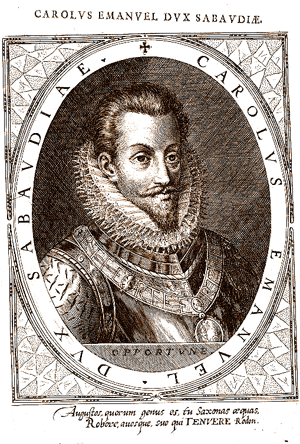 |
In the
Italian politics of the Pope Venice played a part of overwhelming importance.
She was not merely a bulwark against the heretics of Germany and against the
Crescent in the East, but she was the chief centre round which it was possible
to group the Italian forces, with a view to preventing the excessive influence
of Spain and perhaps of France in Italy. Hence the efforts of the Pope to keep
Venice and Tuscany united in a greater degree than was possible, and to draw
them into cooperation with the minor Italian potentates, without bonds and
formal alliances, but by the natural harmony of reciprocal interests. And the
same thought, together with his ardent desire to destroy every stronghold of
heresy in the neighborhood of Italy, induced him to
favor in many ways, openly and covertly, the ambitions of Duke Charles Emanuel
of Savoy, who by flattering the Pope's Catholic aspirations sought to make
himself master of Geneva and of Saluzzo. The
obstinate attempts of the Duke of Savoy to secure Geneva were destined to
failure, though he was more fortunate in those that deprived France for ever of the marquisate of Saluzzo.
In his undertakings Charles Emanuel always found help at Rome, both pecuniary
assistance and a general kindly support against the opposition which he
encountered in other directions.
In spite of the bitter irritation of the King
of France, the objections of the Venetian government, and the coldness, at
times approaching hostility, of his father-in-law, Philip II, Charles Emanuel
held firm, while he was gaining time, and Saluzzo remained in his hands. Sixtus thought that the
heretics would be more easily put down by the hand of the Prince of Savoy than
they could be by the King of France, distracted as he was on every side by the
factions which were tearing his kingdom in pieces. If France were pacified, the
marquisate of Saluzzo might be restored; but in the
meantime Charles Emanuel was guarding it from the heretics, and keeping it safe
for the faith, as though he were the vicar of the Pope. The shrewd prince
availed himself of the Pope's views, and flattered them for the purpose of his
own aggrandisement. Ready to seize every opportunity
of making some attempt in the territory of Geneva, the Dauphiné,
and Provence, he was at the same time striving, though without success, to
change his ducal crown into a royal one.
Public works of Sixtus V [1585-90
We can in this place only rapidly
indicate those events which supply material for other chapters in this volume.
While these were developing, Rome, the papal State, and the Church called for
attention of a different kind. To free the State from brigandage, and to lower
the nobility to the level allowed by law was only, as it were, to smooth the
way for the new duties of government in an age of transformation, which was
substituting a more direct and uniform action for the variety of impulses and
forces that characterised medieval life. The
territory occupied by the Church State, which was fertile and for the most part
well cultivated, could be made to increase its wealth by the development of
industries connected with agriculture and by the sanitation of those malarial
regions where the occupations of life were impeded by the stagnant waters which
rendered them uninhabitable. With a view to this, Sixtus V undertook improvements in the marshes of the Maremma and in the Pontine marshes, devoting especially to the latter, which he visited
during his Pontificate, a considerable amount of attention and of money, and
draining off the stagnant waters into a canal, which took the name of fiume Sisto; this was a magnificent work, which, as Ranke justly
observes, may be regarded as the best attempt to dry up the Pontine marshes
that was made till the time of Pius VI.
He protected the Mediterranean coast by
supplying Civitavecchia with good water, and by the construction of galleys,
which, while forming the nucleus of a papal navy, served as a defence against
the pirates of Algiers, and as a protection against the bandits who infested
the shores of the Tuscan Maremma. At the same time,
by means of the grant of privileges and advances of money, the craft of woollen manufacture that had long been discontinued was
revived in Rome.
Of still greater consequence was the introduction of the silk
industry, which, having been introduced from Tuscany into the provinces of the
papal State, rapidly increased, and, especially in the culture of silkworms,
assumed an importance that has lasted to the present day. In order to develop
this industry Sixtus spared no pains, and conferred
numerous privileges, encouraging the producers, besides ordering the provinces
and communes to contribute in various ways to the planting of mulberry trees,
for the purpose of feeding the silkworms. In the meantime he endeavored to secure and facilitate the means of transit
in the State by opening up roads, and by various works such as the Ponte Felice over the Tiber on the Flaminian Road in Sabina; by
his firmness he forced the Viceroy of Naples to revoke certain decrees
injurious to the fairs and markets of Benevento; and in many ways he secured
the increase of the maritime traffic at several seaports, and especially at
Ancona, justly regarded by Sixtus as of great
importance, because of its position on the Adriatic and its potential relations
with Venice and the East.
Montalto and Loreto |
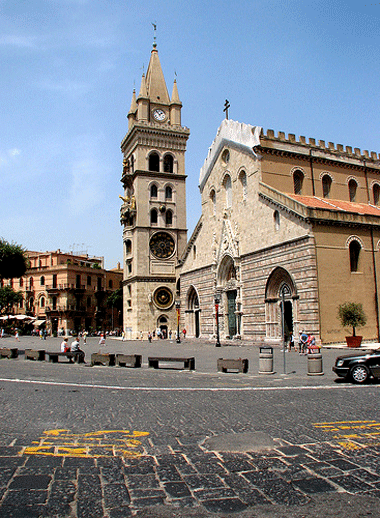 |
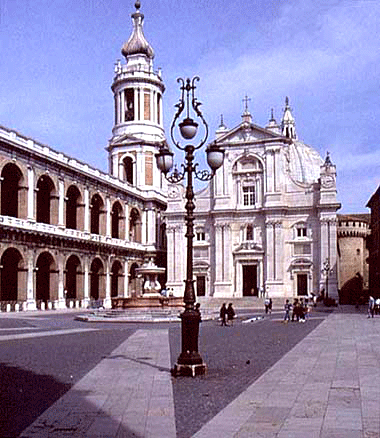 |
Being deeply attached to the province of his birth,
he favoured the Marches in many ways, granting the
title of city to several small towns, and creating some bishoprics, among them
those of Montalto and of Loreto, the famous sanctuary
of which he embellished and enlarged. This sanctuary, situated opposite
Dalmatia, owed its origin to a legend that had transported the holy house of
Nazareth to the Dalmatian and Italian shores of the Adriatic, and may also
perhaps have recalled to the mind of Sixtus his
twofold origin, Slavonic and Italian, and have connected this remembrance with
his aspirations towards the liberation of Europe from the Turks, the long and unrealized desire of his life.
Rome and the Renaissance
The disappearance of the
Middle Ages marked cut for Rome a period of transformation that largely changed
her aspect. The city that had been the scene of baronial strife, of struggles
between Popes and anti-Popes, between Guelfs and Ghibellines, with her massive fortified towers rising on
every side and leaning up against the ruins of Imperial Rome - with her
basilicas, in whose architecture the art of the Cosmati triumphed in its simplicity, its elegance and its fulness of religious piety, while in the gold of the mosaics glowed the Giottesque inspiration of the Roman painter, Pietro Cavallini - this old
medieval city had entered a fresh phase of life, since she had yielded to the
invading spirit of the Renaissance.
The sojourn of the Popes in Avignon, and
the consequent reduction of the population and wealth of Rome, had brought
about a deserted condition of the city; with the Pope there were taken away
from Rome the greater part of the higher clergy and of the ecclesiastical
officials, the principal source of its wealth, while the number of the inhabitants
sank and the concourse of strangers diminished. From this decline Rome had
gradually recovered during the fifteenth century. The impulse of humanism,
passing from the field of letters into that of the arts, gave a notable
character to the new buildings, and furthered the ever-growing development of
the city. The movement began with Martin V, never again to stop. Under Nicholas
V the movement grew and became accentuated; and though death prevented this
Pope, humanist as he was and eager for glory, from completing the general
restoration of the city for which in his mind he longed, yet the works
initiated by him, and especially the reconstructions in the Vatican, opened the
way for the succeeding Popes. Sixtus IV opened new
roads, spanned the Tiber with the bridge that still bears his name, constructed
or embellished a number of churches, built the Hospital of Santo Spirito, and in the Vatican built the library, in order to
gather in it the manuscripts which he and Nicholas V had so lovingly collected,
and that Sistine Chapel destined to be immortalized by the brush of Michelangelo. Throughout the whole of the sixteenth century the
greatest artists of Italy, and amongst them Bramante, Raphael, and
Michelangelo, poured forth in the buildings of Rome the treasures of their
genius; and if, towards the end of the century, the prevailing taste was
losing its old purity, there was no diminution in the power to provide for the
needs and for the embellishment of Rome.
Domenico Fontana (1543 – 1607) |
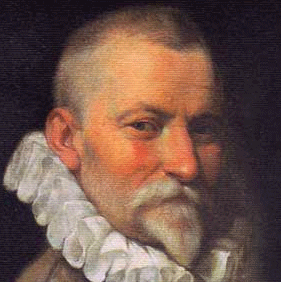 |
In the time of Sixtus V, though much had been done, much still remained to do for the exercise of his
feverish energy. He loved building, and was desirous of raising monuments which
should leave a lasting record of his name. From the days of his cardinalate he
had, in the solitude of the villa built by him on the Esquiline, long been
accustomed to ponder deeply on magnificent works, and, in his conversations
with his architect, Domenico Fontana, who understood
him so well, he had matured in his mind the plans for executing them. The
thought of the colossal undertakings of which the history of Rome offered so
many examples, and of which the very ruins were a speaking testimony, could not
fail to stir his energies. On becoming Pope he set to work with his wonted
rapidity; and Rome saw thousands of workmen laboring simultaneously at the various buildings he conceived and endeavored to bring to a finish during his pontificate: for to begin a thing was with him
to become intent upon its completion. The Popes of the earlier part of the
sixteenth century had chiefly aimed at embellishing the city on the side nearest the Vatican, following as it were the course of the
Tiber downwards from the bridge of Sant' Angelo. The upper zone of Rome, the
greater part of which had remained desolate since the days of Gregory VII, when
it was burnt down by the soldiery of Robert Guiscard, was still very bare,
although it contained not a few basilicas, and above all the mother church of
Christendom at the Lateran. To bind together the higher city and the lower, to
reunite in a measure the Lateran and the Vatican, was the magnificent
conception which, having been furthered by Sixtus,
was the beginning of that tendency to repopulate the higher part of Rome which
was not fully carried out till our days. With this aim Sixtus opened up the magnificent roads that connected the basilicas of Santa Croce in Gerusalemme and Santa Maria Maggiore with the Trinità dei Monti,
and the Quirinal with the Porta Pia; and other roads were made by him in order to join the Lateran with the
Coliseum and the Viminal Hill with the Forum Trajanum, with a continuation along the road then called
the Via Papale as far as the bridge of Sant' Angelo. In order to induce newcomers, and especially
such as were not Romans born, to build houses along the new roads and to people
them, he granted special privileges to the inhabitants: their houses could not
be subjected to confiscation save for the crime of high treason; those who
dwelt there could not be molested for debts which they might have contracted
outside the papal State, and after two years of habitation they entered into
the enjoyment of all the privileges enjoyed by the Roman citizens; those who
were inscribed in a guild were exempt from any levy that the consuls of their
corporation might exact from them.
From the earliest days of his pontificate Sixtus had shown his desire to erect a seat worthy of the
Popes in the Lateran. During the ceremonies of his coronation he observed, in
conversation with some Cardinals, how absurd and inconsistent it was that the
basilica of the Lateran, omnium ecclesiarum mater, and the ideal and perpetual domicile of the Popes, should not have a
building attached to it suitable for housing them. The idea of erecting one had
occurred to two of his predecessors, Nicholas IV and Sixtus IV, both of them Franciscans like himself, but the idea had not been carried
out; now he would put it into execution. And in truth he set to work, and the
splendid palace designed by Fontana arose in a short time, as though by
enchantment. Soon after there extended along one of
the roads he had laid down another papal palace, the Quirinal, part of which
had been built by his predecessor, and which was subsequently finished by Paul
V; and to the square in front of the palace were transported the two colossal
groups which are still so characteristic a feature of it, and have given it the
name of Monte Cavallo.
Piazza di Monte Cavallo |
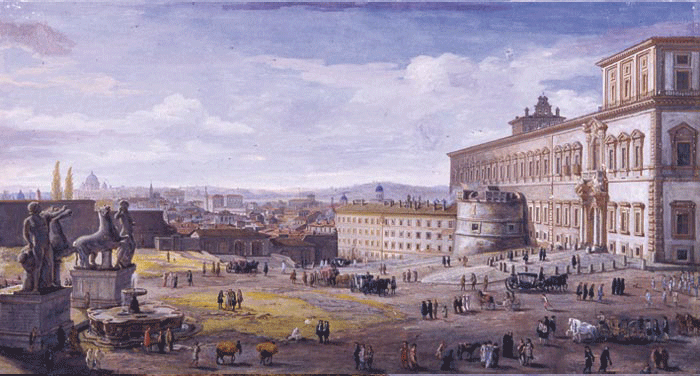 |
In order to render salubrious this vast portion of Rome which it was
proposed to resuscitate, a great supply of water was required, and here again
the ancient Roman traditions served as a model. Sixtus decided to connect various springs of water in the district of Palestrina, and
to bring them to Rome along a distance of about twenty miles, partly by
subterranean channels, partly by means of an aqueduct on arches about seven
miles in length. When the enterprise was begun it seemed to many incapable of
accomplishment within the period of a single pontificate; but Sixtus, as he said in a Bull relating to this work, "would not allow himself to be terrified by the difficulties nor by the
greatness of the expense"; and before the third year of his pontificate
was out, the water which, after his first name, he called Acqua Felice, sprang forth in copious streams from the
monumental fountain which he had caused to be erected on the road leading from
the Porta Pia to the
Quirinal.
Fontana Acqua Felice, Piazza San Bernardo |
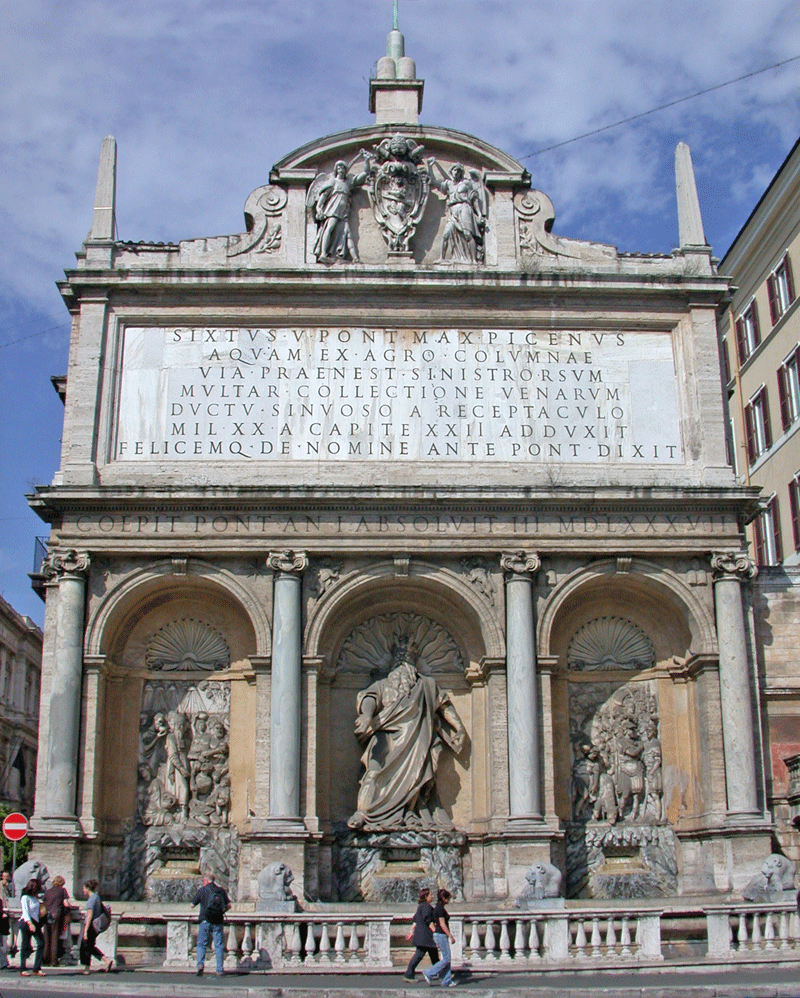 |
While he was attending to these great works, he also occupied himself
with lesser reforms for the good conduct of the city, such as the reform of the
carnival fêtes, which had degenerated into a display of licence that frequently gave rise to grave disorders; and he established useful and
pious foundations. Remembering his Slavonic origin, he erected the church and
hospice of San Girolamo degli Schiavoni. He restored the church of Santa Sabina on
the Aventine. He improved the condition of the Roman University, the Sapienza, of which he had been Rector, by gifts of money
and by enlarging the building. He created monasteries, strengthened and
increased the fraternity for ransoming the slaves who had fallen into the hands
of the Turks, founded a hospice for the poor near the Ponte Sisto,
endowing it with a good revenue, and in the Bull of the foundation affirmed the
obligation resting on every city to maintain such of its poor as are incapable
of work, and to prevent mendicity and its abuses. He
also added to the same hospice a place where the pilgrims who came to Rome
might be received and entertained for three days.
Ponte Sisto |
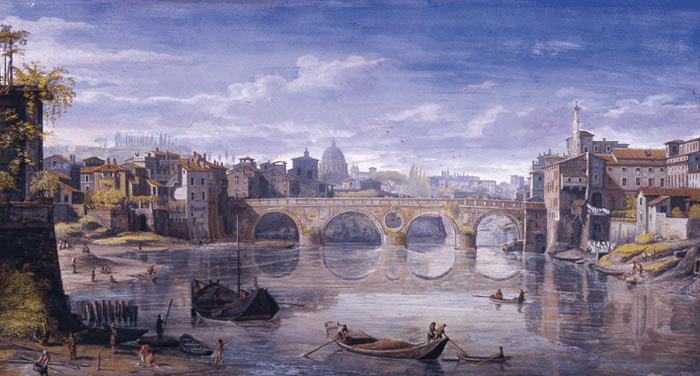 |
Mindful of the benefits of Pius V, to whom he owed his elevation, and
whose example and ideas had strengthened in him his fervid aspirations for the
triumph of Catholicism and his implacable desire for the destruction of
Protestantism, Sixtus contemplated erecting in his honor a memorial sepulchre worthy of the high esteem in which he held him. In the church of Santa Maria
Maggiore he had, as has been said, already in the days when he was a Cardinal
begun to erect a vast chapel consecrated to the cradle of the Lord; and this
he completed after he had succeeded to the pontificate, lavishing on it a great
wealth of marbles, statues, and paintings. In this chapel he had set up the
monument to which, with solemn pomp, he transferred the ashes of Pius V, and in
it he, too, desired to be buried, so as to rest, after death, by the side of
the man who had beeil his friend and had inspired his
actions.
| Santa Maria Maggiore, by Pappini |
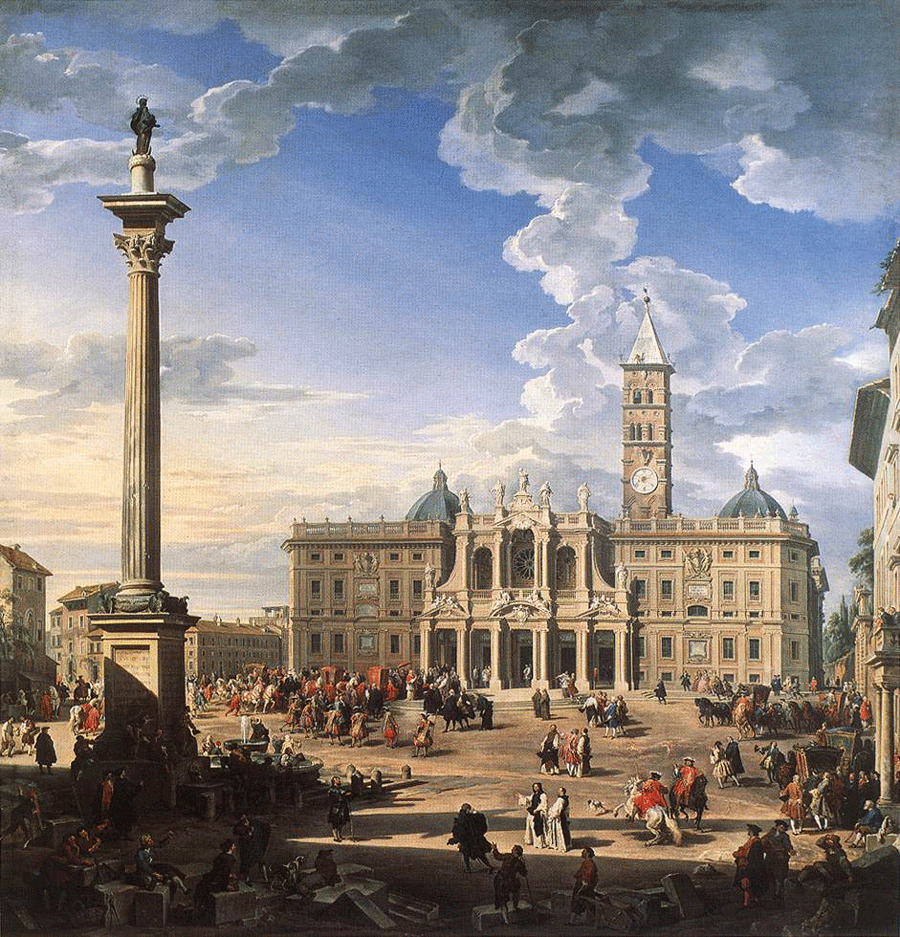 |
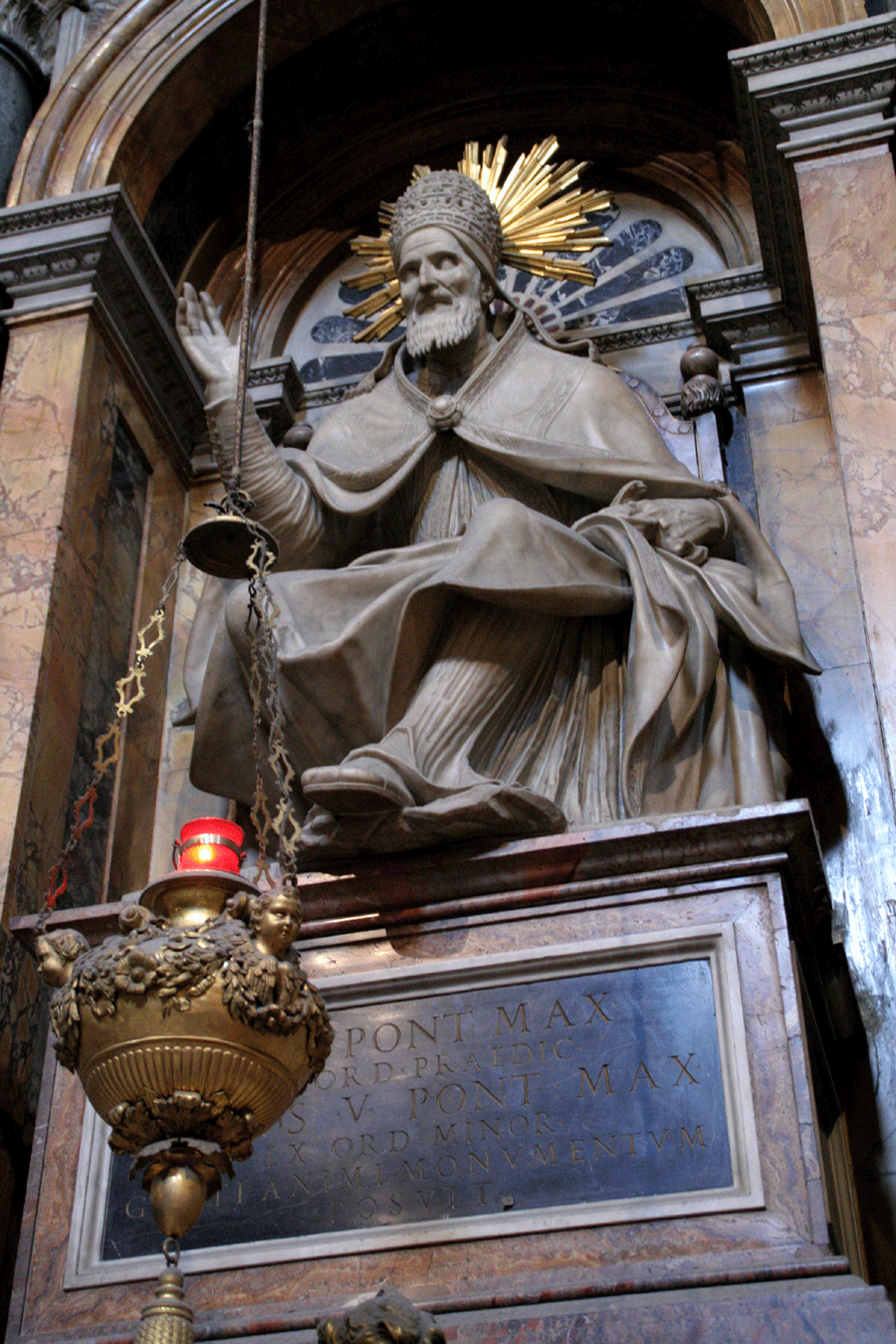 |
| Off to the right of the main altar in Santa Maria Maggiore, the principle basilica of Our Lady in the Western Church, is the so-called Sistine Chapel–not to be confused with the Chapel by the same name in the Vatican decorated by Michaelangelo. This chapel was built by Pope Sixtus V, a Franciscan, to honor his Dominican predecessor Pope St. Pius V, depicted in the sculpture above |
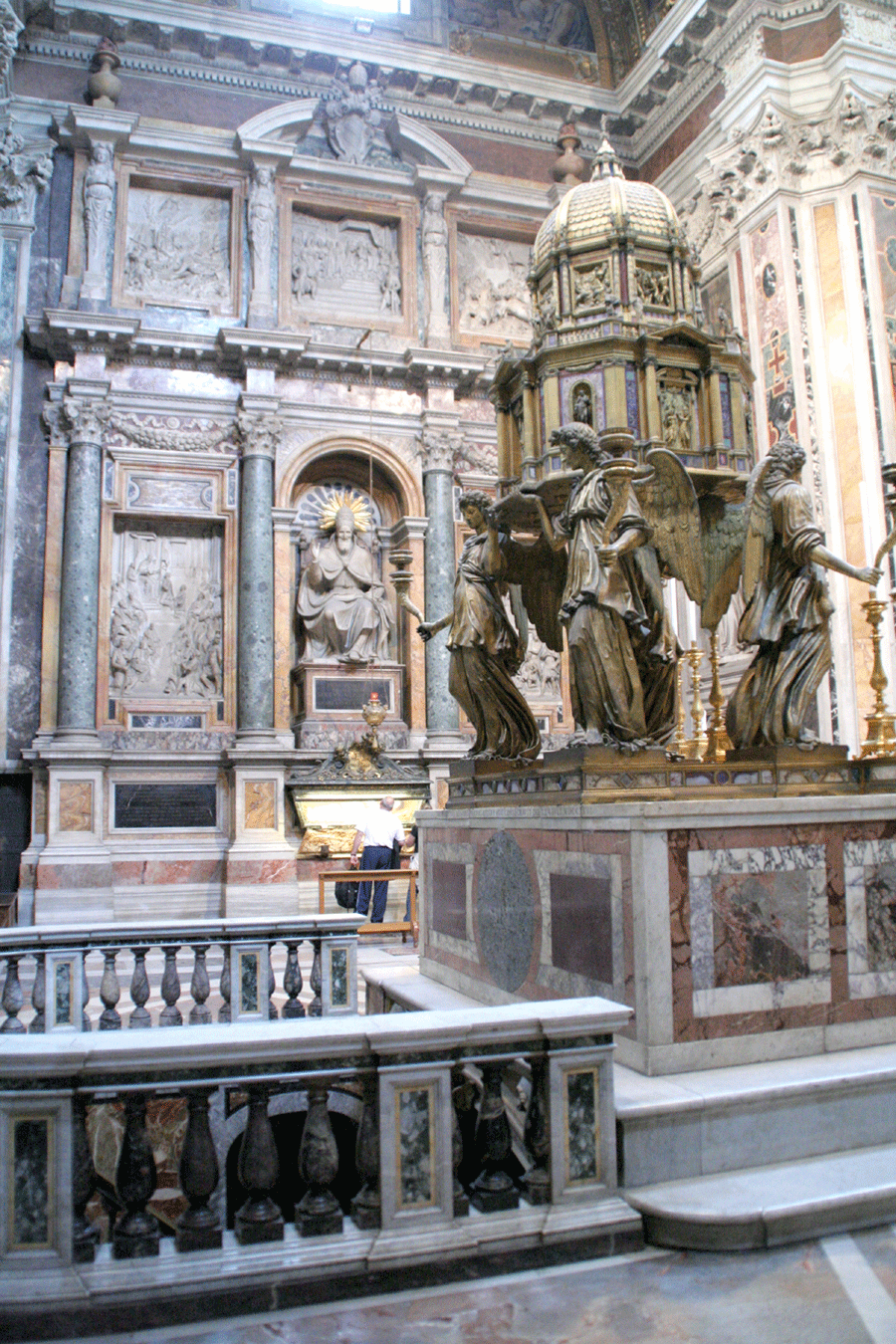 |
St Peter's
The care bestowed on the upper regions of Rome could not obscure the
fact that the basis of the papal City is always the Vatican, and that the
transformation of St Peter's, on which the Popes of the sixteenth century had
vied with each other in lavishing endless treasures, was not yet complete. The
majestic cupola conceived by Michelangelo did not yet rear into the sky the
solemn curves of its lines. From the year 1565, in which Michelangelo died,
various architects - Vignola, Pirro Ligorio,
and Giacomo della Porta - had successively worked at the continuation of the
cathedral, but the cupola remained unbuilt. Nor did
the gigantic task appear an easy one, and, like the aqueduct, it was of such a
nature that its completion was not considered possible in the course of a
single pontificate, even though this should be a long one. Yet it was precisely
this completion of the cupola to which Sixtus V,
supplementing Giacomo della Porta by his faithful architect Fontana, who
subsequently remained alone at the work, addressed himself as to his principal
aim. He felt that in the cupola resided, so to speak, the soul of the entire
church, and that its completion would suffice to secure and hasten on the
completion of that superb artistic effort of the
Catholic religion, which, entering into a new phase through the impulse of men
who were for the most part Southerners, appealed to the imagination of the
faithful by setting the pompous magnificence of its rites against the austere
and bare simplicity of the Reformed worship. During the pontificate of Sixtus the architect Fontana was able to mould the vault of
the cupola as far as the window of the skylight, and on the death of the Pope
the work was so near completion that the first seven months of the pontificate
of Gregory XIV sufficed to finish the skylight, and to put the last touch to
the pinnacle of Michelangelo's grand creation.
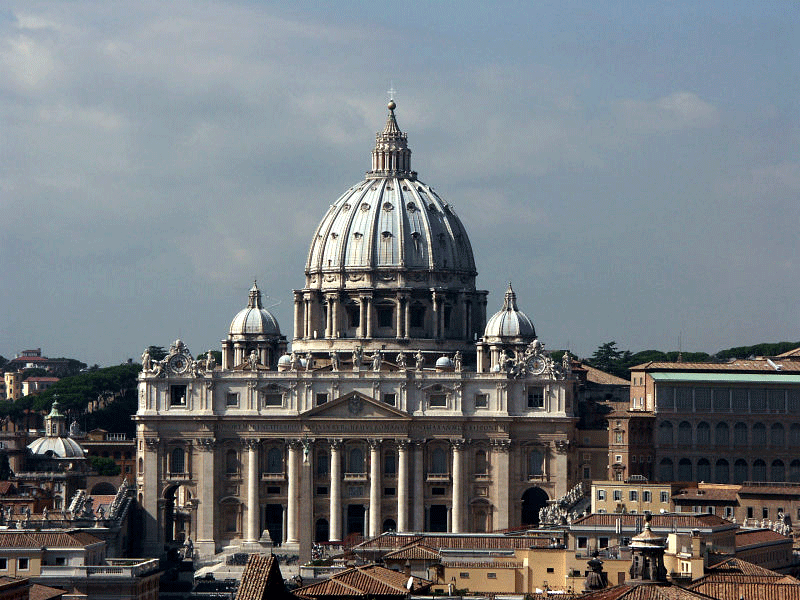 |
But among the works executed in the time of Sixtus V none made so deep an impression on the imagination of the contemporaries and
aroused their wonder to such an extent as the removal and erection on the open
place in front of St Peter's of the obelisk which had formerly adorned the
circus of Nero, and which stood half-buried near one of the sides of the
cathedral. It was one of the first works to which the Pope turned his
attention. To raise up from its base that huge block of granite, and to move it
from its site without breaking it, had seemed impossible to Michelangelo and to
Antonio Sangallo, when consulted by Paul III, who had designed to carry out the
removal. The operation would involve raising the obelisk, inclining it
horizontally, dragging it to its new site, and setting it up afresh. A
commission of persons appointed to examine the numerous projects suggested
selected that of Domenico Fontana, which seemed the
safest and based on the most accurate calculations. Several attempts, suggested
by the envy of rivals and incredulity in the success of the enterprise, were
vainly made to dissuade the Pope and to intimidate the daring architect. In
October of the year 1585, a few months after Sixtus had been elected, the work was begun, and soon there arose round the obelisk
which was to be raised a forest of beams, and plates of iron, and cranes, and
preparations of every kind.
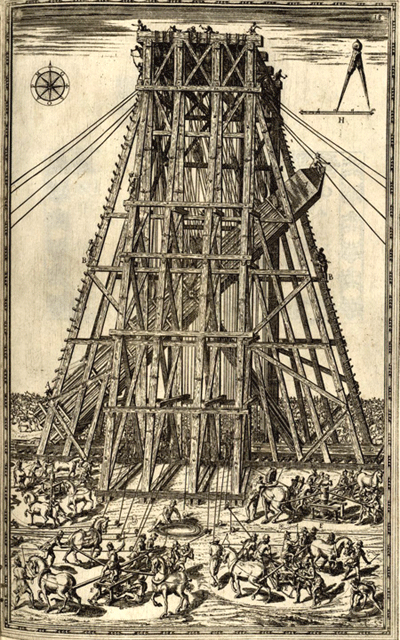 |
The task was hurried on, and already on May 27 in
the following year everything was ready for proceeding with the more difficult
part of the operation, namely the raising of the obelisk and placing it
horizontally on the vehicle that was to carry it. An immense crowd attended the
spectacle, among those present being the Cardinals and the greatest personages
of Rome. A severe edict of the Governor imposed the strictest silence so as not
to disturb the work, and amidst deep silence and intense anxiety the cranes
began to move and the obelisk to be raised. The work was proceeding when
suddenly a voice broke the silence, crying, "Water for the ropes";
and it was seen that the ropes which bound the obelisk were actually on the
point of breaking by reason of the weight laid on them. The counsel so bravely
given, in spite of the prohibition, was at once followed, and the enterprise
was saved. The courageous counsellor - according to
some a lady, according to others a sailor - was a native of the coast of Genoa,
and obtained for the family, named Bresca, the
privilege, extant to the present day, of furnishing for the church of Saint
Peter the palm branches used in the solemn procession of Palm Sunday.
A few
days later the obelisk was conveyed between two platforms to the site destined
for it, and the preparations for its erection were begun. On September 10,
1586, amidst the wildest enthusiasm, while the ambassador of France, Pisany, and the Duke of Luxemburg, who were holding their
solemn entry into Rome, were crossing the square and thus became witnesses of
the spectacle, the obelisk rested on its pedestal; and after having, for
centuries, commemorated Nero, the persecutor of the early Christians, it now
served to celebrate the glories of the cross that adorned its summit.
The idea
of making the Pagan monuments serve the glory of the Catholic faith was
particularly attractive to Sixtus, who detested
Paganism, and who, according to the phrase cut into the pedestal of the Vatican
obelisk, expiated its impure superstition by consecrating its monuments to the
Christian cult. Inspired by the same conception, he raised the obelisks of
Santa Maria Maggiore, of the Lateran, and of Santa Maria del Popolo, and caused the Trajan and Antonine columns, which were in a very dilapidated state, to be restored, placing on the
summit of the former the statue of Saint Peter and on the other the statue of
Saint Paul, and thus dedicating them to the two apostles of Rome.
the Velabrum and the tomb of Cecilia Metella |
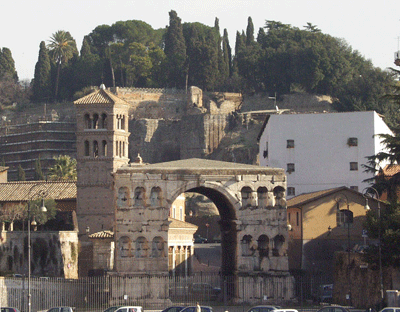 |
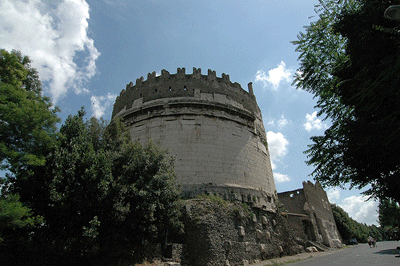 |
But though he
employed the ancient monuments for his religious ends when they could be of use
to him, he neither set store on them for their own sake, nor cared for their
beauty and historical value, but destroyed them with the indifference of a
barbarian if he encountered them on his way, or if he could utilise them for the works he was having executed. He remorselessly made an end of the
ruins of the Septizonium of Severus, of which three
orders of columns remained standing, which he took from the Palatine to employ
them for the embellishment of the Vatican. This was not his only act of
vandalism; and he would have remorselessly destroyed the Velabrum and the tomb of Cecilia Metella if it had not been for the prayers and remonstrances of the Roman nobility. The account of this
episode given by the Cardinal Santoro di Santa Severina in the records of his life is characteristic:
"Seeing that the Pope had turned entirely to the destruction of the
antiquities of Rome, many Roman gentlemen came to me asking me to make
representations to his Holiness to move him from so strange an idea; and the
Pope had chiefly in view the destruction of the Septizonium,
the Velabrum, and Capo di Bove, which was once the tomb of Cecilia Metella, the unique
and only work dating from the times of the Republic. I joined with the Signor
Cardinal Colonna in making such representations, and this reply was elicited
from the Pope : that he wished to do away with the ugly antiquities while
restoring those that had need of it".
The prayers of Santoro and Colonna saved
the Velabrum and the noble tomb of Cecilia Metella,
but they nowise availed for the Septizonium, the
columns of which Sixtus required. Not even the beauty
of the ancient statues found favor in his eyes, which saw in them the expression
of the impiety and of the impurity of Paganism, so that he scarcely allowed
some of the most beautiful of the masterpieces which had been previously
discovered to be preserved and remain exposed to view. Ages might have been
supposed to have elapsed between the bigoted hatred of this former Inquisitor
and the humanistic enthusiasm of his predecessors for the loftiest creations of
ancient art.
The Vatican Library
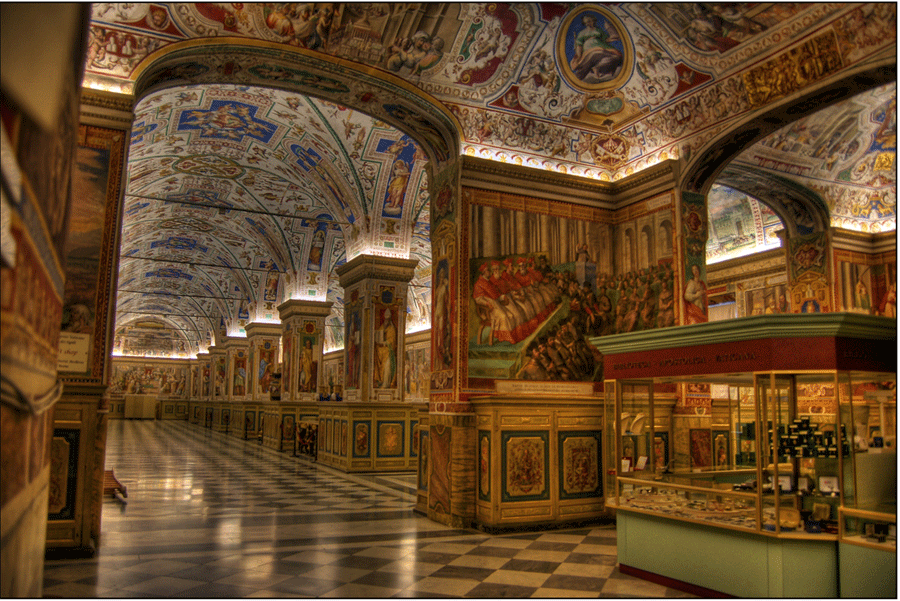 |
The library in which Nicholas V had arranged the manuscripts which
he had collected, was now, although it had been enlarged by Sixtus IV, too small for the need of the new times and for the rapid accumulation of
the books due to the invention of printing. At the close of the sixteenth
century it was felt more clearly than has been understood at a later date that
the Church of Rome, if she wished to hold her own against her adversaries, must
needs, above all else, bring her doctrines into harmony with the existing
condition of learned studies. To a continuous series of attacks, fierce and
full of theological knowledge and historical learning, it was not sufficient to
reply by abuse. A system of efficacious apologetics was indispensable, which
should oppose theologians to theologians, historians to historians, and should
defend and expound the entire mass of the Catholic doctrine, as it had been
strengthened and confirmed by the Council of Trent. The champions of free
investigation and the champions of an authority from which there is no appeal
were to meet with equal weapons for the fray. To this need corresponded the requirement
of books and libraries.
Already, in the year 1581, the Portuguese Stazio, leaving to the Congregation of the Oratory in Rome
his accumulation of manuscripts and of books, laid the first foundation for the
collections of the Bibliotheca Vallicelliana, which
was increased and made celebrated among others by Baronius and by Rainaldus, who wrote in it their Annales Ecclesiastici. Sixtus V, for his part, meant the Vatican to have a library
such as need fear no rivals; and, spoiling without the slightest compunction a
most beautiful courtyard, the work of Bramante, he erected after the design of
Fontana the magnificent Vatican library, which is still admired today, and on
the walls of which he, with pardonable pride, wished the greatest achievements
of his pontificate to be depicted.
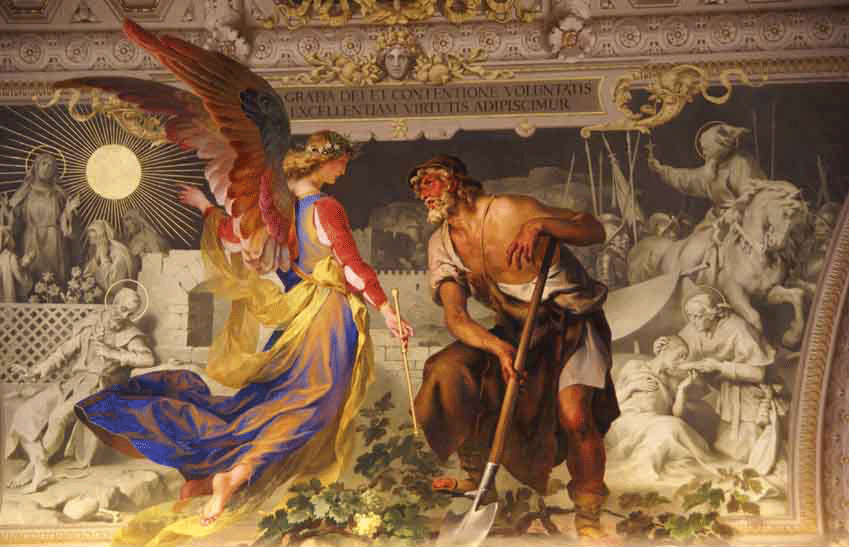 |
To the library was annexed a
printing-office, intended, in the words of the epigraph sculptured on the door, ad sanctorum patrum opera restituenda catholicamque rellgionem toto terrarum orbe propagandam. In this printing-office Sixtus V continued his publication of the works of St
Ambrose, which he had, while still a Cardinal, begun to print at Milan, with
the assistance of the saintly Archbishop of Milan, Carlo Borromeo;
he promoted the printing of the works of St Gregory and those of St
Bonaventura, whom he placed among the Doctors of the Church, and promoted the
printing also of the great Bullarium Romanum of Cherubini. He likewise took in hand the
publication of the Septuagint and of the text of the Vulgate, over which he
presided in person. It was a work the completion of which he had much at heart,
as one of the essential results of the Council of Trent. A year before his
death he spoke of it to the Venetian ambassador, Alberto Badoer,
saying to him that the Council had ordered the revision of the Bible, and that
no one had occupied himself with it. He had therefore charged some Cardinals
with the task, but, not being satisfied with their work, he had himself taken
it in hand, and was in hopes that the printing would soon be finished. Badoer, reporting this conversation to the Doge, added that
the Pope had told him that he was engaged on this very work just when he had
entered his room, "getting through the labor with great enjoyment, and this was the plan he followed : after having
completed a sheet he had it revised by Father Toledo and some Augustinian
Fathers, men of the greatest distinction, who, after having diligently revised
it, despatched it to the press. And he added that the
Pope dwelt on this subject for some time with much gentleness. The Bible
was really printed a short time before his death, but it did not appear
sufficiently correct; and the definitive edition, still bearing the name of Sixtus Quintus, was published by the authority of Clement
VIII in 1592.
The Congregations of the Sacred College
To give movement and life to the decrees of the Council of Trent was the
continuous thought of Rome during the struggle which she carried on against the
Reformation for the unity and authority of the Church. With this end in view it
became more and more desirable to organise on a
secure and permanent basis the vast and varied machinery that was accumulating
at Rome for the discharge of ecclesiastical business. Before the pontificate of Sixtus this business was generally despatched by the Pontiff with the aid of the Cardinals
gathered in consistory, before whom the questions to be discussed were laid, so
that they might express their opinion on them, prior to the final decision,
which was reserved for the Pontiff. The part taken by the Cardinals in the
affairs that concerned the general interests of the Church was undoubtedly
large, and added considerably to the importance of their influence on the
ecclesiastical administration. But new needs were now arising owing to the
ever-growing development of international communications and to the increase
and complication of the questions that had to be treated after the formidable
advent of the Reformation, which occasioned in the Council of Trent a tendency
towards concentration that was destined to find its focus in Rome. It had
become difficult to treat each matter as it arose by means of a discussion in a
general assembly; and thus it became necessary to distribute the subjects into
various sections, and to entrust their discharge to special offices, whose
advice would, by virtue both of tradition and of continued study, be fully
competent and authoritative.
On various occasions the predecessors of Sixtus V had appointed Congregations of Cardinals, charged
to study certain special questions and then to report on them to the Consistory; but these were not really permanent appointments and provided only for
particular cases. Sixtus V felt that the time had
come to set up a new constitution for the government of the Church which should
secure its expeditious and systematic conduct and avoid the many inconveniences
of the old methods. By diminishing in all questions the interference of the
Consistory, the notable result was also achieved of diminishing the excessive
preponderance of the more influential Cardinals in the special questions
affecting interests which they favored or, under the
name of Cardinal Protectors, represented officially in the Sacred College. This
was a great advantage, in addition to that accruing from a conduct of affairs
which was more rapid, more uniform, and, in certain cases where caution was
necessary, more secret. Against these advantages, however, had to be set the
danger of an excessive centralization, which, by
lessening the importance of the Sacred College, might succeed in stifling all
opposition there, and, by rendering the Consistories all but useless, reduce
them to a mere formality. It cannot be said, however, that this disadvantage
was much felt during the pontificate of Sixtus, who
liked frequently to assemble the Cardinals in Consistory, willingly discussed
matters with them, and often followed their counsels. In the bull Immensa aeterni Dei he set out
the reasons that induced him to institute the Congregations. There were fifteen
of these, some of which were concerned in the administration of the Church,
others in that of the State. The first was that of the Inquisition or the Holy
Office, which had been instituted already by Paul III, to examine into the
questions of dogma that arose from the movement of the Reformation; it now
underwent reorganization, and was charged with the
treatment of all questions relating to faith, as the only tribunal that judged
with final authority. The Segnatura occupied itself
with the concessions of grace, the others devoting themselves to the
establishment of the churches, the rites and ceremonies, the Index of
prohibited books, the interpretation of the Acts of the Council of Trent, the
Regular friars, the Bishops, and the Press of the Vatican, which last, as we
have seen, was, according to the Pope's view, destined to become a great centre
of Catholic culture. Among the Congregations which occupied themselves with
temporal administration, one, which was called that of the Wealth of the State,
and to which Sixtus had assigned a special fund of
two hundred thousand crowns, had to provide for cases of poverty and to prevent
scarcity by supervising the equal distribution of commodities in Rome and in
the provinces. The Congregation for the navy saw to the construction and
armament of vessels ordered by the Pope and to the security of the seashore;
three others were instituted to examine questions arising from grievances
suffered by subjects of the State in the imposition of the taxes, for the
custody of the roads, bridges, and waters, and for State consultations in cases
relating to legal questions. Finally one Congregation was charged with raising
the fortunes of the University of Rome, the Sapienza,
which Sixtus wished to see committed to the special
care of the Popes, as had, even in the Middle Ages, been the case with the
Sorbonne at Paris, with the University of Oxford in England, and with those of
Salamanca in Spain, and Bologna in Italy. By means of these Congregations the
new administration of the Church and of the Pontifical State may be said to
have been organised in the form that has lasted to
the present day, thus acquiring the characteristics of centralization and of uniformity which have predominated in it till now. They were a strong
bulwark for the unity of the ecclesiastical authority, and consolidated the
work which the papal diplomacy and the religious Orders endeavored to achieve, by putting an end to the prevalence of Protestantism in the
districts most subject to its influence, and endeavouring to restore Catholicism in those that had detached themselves from it.
Sixtus V and the Jesuits
Being bound by friendship to the founders of the chief religious Orders
that had arisen in his time, Sixtus could not but be cognisant of the full value of these orders in the struggle
that was being carried on. The Order of the Jesuits, above all, that had risen
so rapidly and was already firmly rooted in so large a portion of the world,
was a formidable force which had to be reckoned with. The favor of Sixtus had on many occasions not been withheld from the
Jesuits, and he had made use of them especially in propaganda and exploring
work in the Protestant countries. But, having himself risen from a medieval Order,
he never succeeded in being in complete sympathy with the newer Society, and
foresaw that the rigorous discipline of the Jesuits, their passive obedience to
their chiefs, and the unbending tenacity of their devotion to the interests and
aims of their Order, might tend to transform it gradually into a kind of Church
within the Church, and cause its sway to assume such proportions, at least from
time to time, as would make the directing authority of the Papacy subservient
to its interests.
The Jesuits differed from the medieval Orders in this that,
though moving in society and penetrating into every corner of life, they
remained altogether divided from the men with whom they mingled, and appeared
instruments of action deprived of every deep human sympathy. The abstract ideal
that directed them, like the impulse of some impassive fate, conquered all
feeling in them; and individual members of the Society seemed to become fused
into a single whole of mysterious purpose and sectarian aspect. And thus from the
very first they awakened around themselves those jealousies and suspicions that
have clung to them ever since.
In a measure Sixtus shared these suspicions. Although he treated certain Jesuits personally with
great distinction, Father Toledo, for instance, to whose sermons he liked to
listen and whom he employed for the revision of the Bible; yet he remained cold
towards the Order at large, especially in Italy and in the countries where
Catholicism was most secure. On certain occasions he supported them, defending
them against the attacks of the lay authorities, especially of Philip II, who
availed himself of the complaints of the Spanish Inquisition and of the
jealousy of the Dominicans to thwart the excessive authority of the General of
the Order, who, without any possibility of control on the part of Spain, was
from Rome directing his Jesuits according to his pleasure. But although at the
beginning Sixtus V had found the claims of Philip
excessive, gradually, moved by the King's firm attitude, by the persistence of
his ambassador Olivares, and by the Spanish Inquisition, more and more
persistent in its complaints of the Jesuits' contempt for every authority, and
more especially by his own deep repugnance against leaving so dangerous a power
in the hands of a religious Order, he began seriously to seek an opportunity
for revising its constitution and taking in hand its reform.
The Society of Jesus thus found itself in a position of serious danger;
and all the wise steps taken by its General, Father Acquaviva,
seemed insufficient to save it. Cardinal Caraffa, who
was charged with revising the rules of the Order, was on the side of the
Jesuits; and on their behalf representations were sent to Rome from every part
of Europe, especially from the Princes of Germany, who regarded them as
valuable auxiliaries, and were convinced that Philip II and the Pope were
oblivious of the true interests of Catholicism in thwarting their activity. But
the Pope stood firm, hereby only increasing the fervor of the defending party, although Father Acquaviva,
who understood the difficulties of the situation better, endeavored to restrain them. A Jesuit preacher, who, from a pulpit in Madrid, hurled the
gravest charges against the Pope, asserting that he was in league with the
heretics, only caused the Pope to continue more obstinately in the path upon
which he had entered. Father Acquaviva received a
formal notification of the papal decrees with regard to the rules of the Order,
which were substantially modified, and with regard to their very name, of which
they were deprived, the Order being compelled to relinquish the title of
Society of Jesus. The Society was affected at the most vital points; but, when
this decree was proclaimed, Sixtus was in the last
days of his pontificate, and his death nullified its whole effect. His
successor without delay reestablished the constitution of St Ignatius on its
former basis; and the Jesuits, without further hindrance, resumed the course
of their singular career in history. Even before constituting the Congregations
of the Cardinals, Sixtus V had regulated the
composition of the Sacred College, fixing the number of the Cardinals at
seventy, and taking great care that the choice of them should accord with the
importance and dignity of the office. Feeling that at the beginning of his
pontificate he had himself not always adopted such a standard, and that he had
on this account been the subject of reproofs, the justice of which he could not
but recognize in his inner conscience, he
subsequently endeavored in the course of his
pontificate to make amends; and the names, among others, of Cusani,
Allen, Morosini, and Caetani were certainly such as conferred honor on the
purple. Having in this way set up a precedent for his successors and for
himself in a matter of high importance, he went on to expound the principles of
the Council of Trent, and reinforced himself with assistants capable of aiding
him, and of whom he had need, not only for the central administration of the
Church, but also in the matter of the manifold international relations which
the disturbed religious conditions rendered more delicate and complicated.
These relations constituted the most difficult part of the papal activity at
the end of the sixteenth century, and, by their uncertainty, reflected the
political crisis which now existed in Europe.
Sixtus V and the Protestants
Sixtus V, who had ascended
the throne with such matured and definite ideas on every other point, for his
part felt these uncertainties, and could not always overcome his hesitation as
to the course which he should adopt. He had a clear idea of the ends which he
strove to attain, but it was not possible for him at once to see clearly the
means whereby he might reach them, even when his natural instinct indicated
them to him. The essential idea in his policy was the return of the Protestants
to the faith of Rome, and this always made him long for the conversion of those
princes who had abandoned it. These, however, did not respond to his wishes;
and, while at times he encountered strong opposition and hindrance on the part
of the Catholic Princes who were moved by different experiences and different
views, he was also involved in frequent difficulties with the most ardent
partisans of Catholicism, who, especially in France, struggled against their
adversaries out of party hatred even more than out of religious zeal. His mind,
though thus firmly fixed, could not but fully acknowledge the superiority of
the leading Protestant Princes over the vacillating disposition of many
Catholic potentates.
Rudolf II (1552 – 1612), Holy Roman Emperor (1576-1612), King of Hungary (1572-1608), King of Bohemia (1575-1608/1611) and Archduke of Austria as Rudolf V (1576-1608), a member of the Habsburg family. |
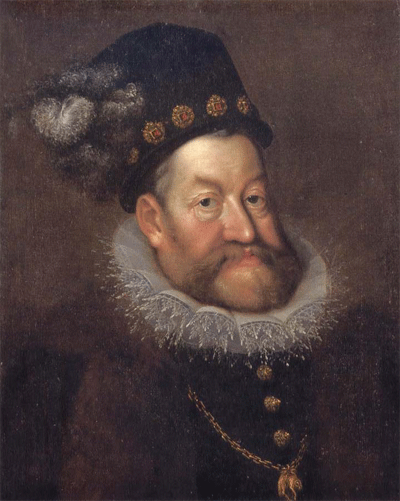 |
Leaving aside for the moment his relations with Philip II, to which we
shall return, we find that the Emperor Rudolph II appeared to the Pope a source
of weakness rather than of strength. The Emperor was displeased because, in a
question between himself and the Farnese, the Pope had shown himself favourable to the latter, and because, instead of helping
the Archbishop of Cologne to recapture Neuss from the Calvinists, he had urged
Alessandro Farnese to make himself master of it; he was also dissatisfied with
the attitude of Rome both towards the Protestants and in the questions
concerning the succession to the Empire. He therefore exhibited increasing
coolness in his relations with Sixtus, who, for his
part, showed himself impatient because it seemed to him that the Emperor's
shoulders were not broad enough to bear the burden of the projects he would
have liked to see him put into execution.
Far dearer to the Pontiff was the
King of Poland, Stephen Bâthory, on whom he had set
many hopes that were soon to be disappointed. The death of this brave prince
opened up grave questions with regard to the succession, which led to a war
between the two principal claimants, Sigismund of Sweden and the Archduke
Maximilian, who suffered defeat under the walls of Cracow, and was taken
prisoner. Sixtus, who hoped for the conversion of
Sweden, and had little faith in the Habsburgs, was at heart favorable to Sigismund, but he had to be prudent so as not to arouse the uneasiness and
irritation of the Emperor, of Philip II, and of the Grand Duke of Tuscany, all
of whom together were asking him to intervene on behalf of Maximilian. The Pope
conducted the business with cautious tact, and sent the Cardinal Aldobrandini, who later became Pope Clement VIII, as his
legate to Poland, to conduct the negotiations that resulted in the conclusion
of peace. Maximilian obtained his liberation, but renounced his claims to the
kingdom of Poland; and both the Empire, which acceded to the plan, and the
kingdom of Poland mutually pledged themselves, in case they should separately
conclude treaties with the Turks, not to accept conditions that might in any
way be detrimental to the other Power. This clause did not please the Emperor,
who regarded it as an inconvenient bond; but it appeared of great importance
to the Pope, who understood the full value of making the two States mutually
responsible in their relations as opposed to the Ottoman Power.
About this time, while death was robbing the Sacred College of several
Cardinals who had played an important part in contemporary history, such as Sirleto, Cesi, and the great
Cardinal Farnese, another of the most eminent Cardinals, Ferdinande de' Medici, in October, 1587, laid aside the purple and succeeded his brother
Francesco on the throne of Tuscany. In spite of certain differences of
character between him and the Pope, the new Grand Duke knew how necessary it
was for him to maintain with the Pope the friendly relations that had been
preserved by his brother; and Sixtus, on his side,
supported him. They had common interests, and they knew full well that on the
continuance of these relations between them, and of a good understanding with
Venice was based the independence of their policy in Italy and much of their power
in international relations. This community of interests brought them together;
and the union of the three Italian States was displayed principally in
questions relating to France, where it may be said that in a measure the
problem that was being agitated was the vital one of the future of Catholicism.
Sixtus V and the French Religious Wars
England and a large portion of the northern countries had been able to detach
themselves from the Catholic Church without destroying its existence, but it is
quite clear that the loss of France would have struck a mortal blow at Rome. During
the brief pontificate of Sixtus V were developed some
of the most decisive events in the civil war which was to settle the religious
destiny of France; and the political direction of the Church with regard to
them was for the aged Pontiff a constant care, a mental strain, full of doubts
and of passionate and torturing anxiety. Round Henry III, the last scion of the
Valois dynasty, a weak man, incapable and without prestige, the rival parties,
moved by internal ambitions and stimulated by foreign greed, were in violent
agitation. The Guises on the one side, and Henry of Navarre on the other, were
aiming at the throne, the former with the support of Spain, the latter with
that of the Protestant sovereigns; and the price of this support seemed to be
the predominance of some foreign influence, and perhaps the dismemberment of
France. On succeeding to the Pontificate Sixtus had
found the tendency in the Sacred College very favorable to the Guises and the League, who, after having chosen the Cardinal of Bourbon
to be the heir of the French crown, were making every effort to obtain from
Rome a bull that should declare Henry to have forfeited his claim to the
succession. The fitful attempts of Henry III to enter into friendly relations
with the King of Navarre increased at Rome the influence of the League, which
was skilfully supported by the ambassador Olivares,
and at that time not sufficiently counterbalanced by the opposition of the
ambassador of France, of the Cardinal d'Este, and of
the representatives of Venice and of Tuscany, who made every effort to
demonstrate the danger of having recourse to extreme measures.
After some hesitation Sixtus, in September,
1585, issued the Bull which declared the King of Navarre and the Prince de
Condé to be heretics, and excluded them from any claim to the kingdom of
France. This was an action which he afterwards regretted, when he began to see
more clearly the right course to adopt; but, while in this he simply followed
the policy of Philip II, he realized from the beginning
that it was necessary to bring about a union of Catholic France, freeing it
from the insidious support of Spain. It had been his idea to unite Henry III
with the League in a sincere spirit of reconciliation; but this was an
illusion, and he soon began to recognise it as such.
Almost in spite of himself the idea of a sincere conversion of the King of
Navarre grew in the mind of Sixtus. Although the
continuous wavering of the French Catholics made the policy of the Pope
hesitating and changeable, and although Philip II endeavored to profit by it by making it serve his own ends, yet Sixtus remained firm in his purpose of achieving the triumph of Catholicism by
overcoming its internal divisions and preserving the integrity of France. The
revolt of Paris and the Day of the Barricades, which determined the flight of
the King and delivered Paris into the hands of the Duke of Guise, increased the
perplexity of the Pope. While on the one hand he held that Henry should have
caused Guise to be taken prisoner and have had his head cut off without
hesitation, it seemed to him, on the other, that, in face of so incapable a
King, Guise was now the only defender of the Faith. By means of his Legate, Morosini, he endeavored to make
peace between the two parties, but his efforts came to nothing by reason of the
suspicions and ill-will of those concerned; he also thought for a moment to
effect an alliance between Henry III and Philip II, making himself the
mediator: but Philip remained cold, and Henry did not know himself what he
wanted. Everything was in a state of indecision, when suddenly there came news
that the Duke and the Cardinal de Guise had been put to death, and that the
Cardinal de Bourbon and the Archbishop of Lyons were prisoners of the King of
France. The murders made a deep impression in Rome. Sixtus who, in the wonted impetuosity of his speeches, had not shown himself averse
from the gravest measures against the Guises, when they appeared as rebels,
felt disgust at these treacherous deeds, and horror at the murder of a
Cardinal. The position of the Pope was difficult : the ambassador of Spain and
the Cardinals who adhered to him endeavored to
exasperate him, and neither the ambassador Pisany nor
the Cardinal Joyeuse could prevent him from
delivering, in full Consistory, a violent address against the King of France.
Sixtus V and Henry IV
Almost without wishing it the Pope was inclining towards Spain, who seized the
opportunity and tried to draw him over to her side; but the thought of the
integrity of France and of the interests of Italy always kept him in a state of
hesitation, and he was further induced to delay by the representatives of
Venice and of Tuscany, ever averse to the Spanish hegemony. Henry III was now
inclined to come to terms with the Huguenots. The greater the contempt of Sixtus for the King of France became, the more insistently
he was filled with the idea, a secret temptation as it were, of a possible
conversion of the King of Navarre and of the pacification of France by his
instrumentality. But as yet neither the idea nor the time was ripe. The truce
established in April of the year 1589 between the King of Navarre and Henry III
led to an open rupture between the latter and Rome. The Pope after much
hesitation issued a monitorial in which he required the King of France under
penalty of excommunication to liberate the Cardinal de Bourbon and the
Archbishop of Lyons, and to present himself in person or to send his
procurators to Rome in order to receive pardon. Diplomatic relations were
interrupted on both sides. Sixtus V was, in spite of himself,
drawn into the vortex of Spanish politics, when the dagger of Jacques Clement,
by ending the life of the last of the Valois, opened the way to the throne for
Henry IV and plunged the Pope into fresh difficulties. It was necessary at all
costs to preserve the Catholic faith in France; and, since Henry IV was
proclaimed King without being converted, no other course appeared to be left
but to support the League. The Pope named as his legate in France the Cardinal Enrico Caetani, a persona grata with Philip II and favorable to the League, to whose
chief he was accredited, pending the liberation of the Cardinal de Bourbon, who
was recognised as King. At the end of 1589 Sixtus,
seeing no other course, had gone so far as to propose to the King of Spain an
alliance, according to the terms of which a campaign was to be undertaken
against Henry IV, and the question as to the succession in case of the death of
the Cardinal de Bourbon to be then settled by agreement. However, the ultimate
aim of Sixtus was again the union of all the Catholic
forces within the boundaries of France, so that these, and not the party
interests of the League and of Philip II, might have the upper hand; but it
was an aim not admitting of realization. In the
meantime Tuscany, and still more Venice, were following a different path, and
inclined, though with great caution to favor Henry IV, endeavoring to influence the mind of the Pope. For a moment the friendly attitude of Venice
towards the heretical King threatened to disturb the relations between the
Republic and Rome, but the skill of Venetian diplomacy succeeded in warding off
the danger; and then there began round the Pope an eager and unending duel
between the Venetian and Spanish diplomatists, and between the adherents of the
two parties hi the Curia. In proportion as Venice gradually gained ground, the
mistrust of Philip II and the irritation of his ambassador, Olivares, increased; and they were filled with the fear lest Sixtus should end by favoring Henry IV, in the hope of his
conversion. The fear was justified. Sixtus returned
to the Italian policy adverse to the universal predominance of Spain, and
sought for other ways by which to preserve Catholicism in France.
The arrival
at Rome of the Duke of Luxemburg, who represented the Princes and the Catholic
nobility that had adhered to Henry IV, and who spoke in his name, assuring the
Pope of his readiness to embrace the Catholic faith, made the struggle keener
and more active. The large and influential Spanish faction of the Sacred
College endeavored, in agreement with the
ambassador, Olivares, to bring all possible pressure to bear on the Pope, to
induce him to dismiss the Duke of Luxemburg. The Pope held firm and showed that
he wished to listen to Henry IV and to see if it was possible to come to an
understanding with him. Then Olivares, relying on the compacts that had been
entered into between Philip II and Sixtus V, insisted
on their fulfilment, showing himself determined to
have recourse to extreme measures. He demanded the immediate excommunication of
Henry IV and of all his adherents, and went so far as to threaten a schism in
Spain, while in the meantime soldiers were collecting near the frontiers of the
kingdom of Naples, and seemed by their presence to recall the troops of Charles
V and the sack of Rome. It was a period of mortal anguish for Sixtus, who, being now discouraged, and crushed by the
overwhelming power of Spain, was on the point of yielding. The victory of Henry
IV at Ivry (March 14, 1590) served to relieve him of
the load that was pressing on him. Although Philip II was more urgent than
ever, Sixtus had taken courage to resist, and strove
to escape him by temporising. He now felt that the
conversion of Henry IV to Catholicism was assured, and that this was the man
destined to reunite and to pacify France. In order to preserve her adherence to
the Catholic faith it no longer appeared to him inevitable to deliver her over,
together with Italy, to the absolute suzerainty of Spain. The Duke of Sessa, sent by Philip II, after many bitter discussions and
prolonged negotiations, failed just when he appeared to be succeeding; and Sixtus, whose mind was now made up, refused all support to
Spain and freed himself from every restriction as to France.
Death of Sixtus V [1590
This was the last
action of his life. It fell to one of his successors actually to receive Henry
IV into the bosom of the Catholic Church. The long and implacable struggle with
the Spanish ambassador which Sixtus had endured, the
tormenting doubts and the anxieties to which he had been a prey for more than a
year, had undermined his physical strength and worn him out. His work was done.
On August 13, 1590, he held his last Consistory; on the 19th he still saw
Olivares and the Duke of Sessa and disputed with them; on the 20th he assembled the Congregation for the affairs of France. Though
he still endeavored for a few days to attend to
affairs, he was now dying; and on the evening of August 27 he expired. He had
reigned only five years and four months, but deep traces of what he had
achieved remained behind him. At Rome, in spite of the great works he
accomplished, his loss was not regretted; indeed the people tried to pull down
a statue that had been erected in his honor on the
Capitol. His severity weighed heavily on those who were in immediate contact
with him; and even the nobles could not love a Pontiff who had curbed them so
much, and compelled them to submit to the laws. He was, however, respected for
his life, which was simple and austere, and disinterested, too, so far as he
himself was concerned, although he had conferred a high position on the two
grandsons of his sister, and elevated her two granddaughters by marrying them
into the houses of the Orsini and of the Colonna.
Spain rejoiced at his death as at that of an enemy, while other States
regretted him, especially Venice, who felt that she had lost in him a faithful
ally.
In the pontificate of this remarkable man is summed up the greater part
of the life of Rome and of the Church in his time. His firm intellect and iron
hand gave to the structure of the Roman Church and to its temporal State the
imprint for which his immediate predecessors, and especially Pius V, had
longed, and which his immediate successors were able to mark more deeply after
him. He was not a creator of events, if, indeed, one man by himself can ever be
such; but he had an intuitive feeling for the direction to which the events of
his time were tending, and knew how to guide the current of their advance.
Having come late into power, after a life of seclusion spent in thought, he
brought to the throne a wonderful spirit of organization,
and, together with well-matured and precise ideas, that lightning rapidity in
executing them which struck the imagination of his contemporaries, and which
has surrounded his name with legends and made it popular up to the present day.
The world around him was transformed. He did not and could not see the entire
import of so vast a transformation, but he felt what action he was himself
called on to accomplish in the midst of the changes around him, and he
accomplished it. He did away both with the bandits and with the overweening
power of the nobility, which was clogging the authority of the State and
hindering its centralizing tendencies; he restored
the exhausted papal finances and employed the wealth accumulated by him as a
political instrument, which increased his power and influence in international
relations, and also for the purpose of bringing about the transformation of
medieval Rome into a new city. He reconstituted the State, established the text
of the Sacred Books, reorganized the administration
of the Church according to the decrees of the Council of Trent, and, while
showing favor to the new religious Orders, maintained his sympathy for the
old, from one of which he had sprung, and perceived the danger of the rising
power of the Society of Jesus. He struggled in every region in order to secure
the victory of Catholicism in Europe, and especially in France, when the
necessity of the victory was vital for the Church of Rome. In the triumph of
this Church as he conceived it lay, according to his view, the complete triumph
of the faith of Christ. He could not see that he was the representative of one
only of the great Christian forces which were then in mutual opposition, but
which all strove together throughout the ages by mysterious ways for the new
great advances of the Christian ideal. A few years after the death of Sixtus, from the slopes of the Janiculum,
and in sight of the dome that he had raised, the great soul of Torquato Tasso, the last interpreter of the sacred ideals
of the Middle Ages, was to take its heavenward flight ; and a little later, on
the square of the Campo di Fiori,
amidst flaming faggots, the restless spirit of Giordano Bruno ceased to torment
itself, leaving to his successors the painful heritage of modern philosophic
doubt. Between the extreme phases of human thought that were being developed, a
great preserving force of authority and tradition was, as it were, a necessity
of the laws of history : Sixtus V consolidated this
force, and gave it unity of form and of scope.
|



